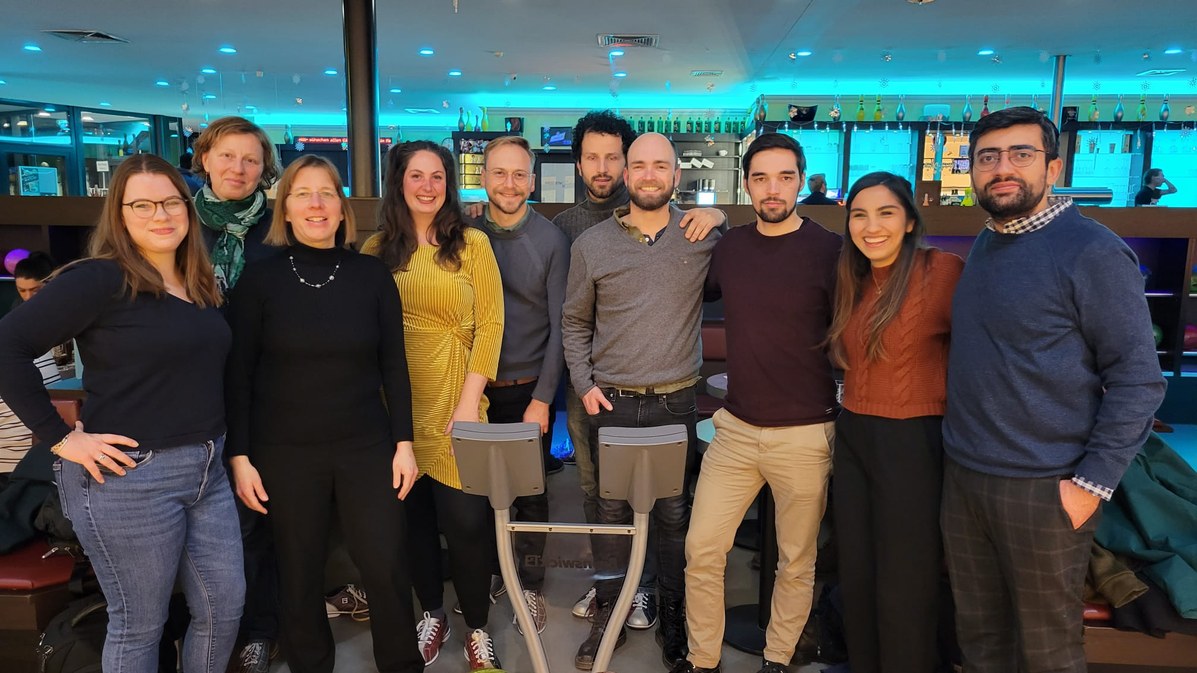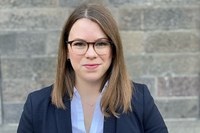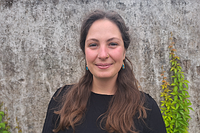Prof. Dr. Andrea Gawrich
Home
- Prof. Dr. Andrea Gawrich
-
Professorin
für Internationale Integration mit besonderem Bezug auf das Östliche EuropaProf. Gawrich forscht zu Sicherheitspolitik, Demokratieförderung, Konfliktforschung, zu EU, OSZE, Europarat und NATO. Aktuell leitet sie ein großes EU-Projekt zur Demokratieförderung in der EU-Nachbarschaft (https://shapedem-eu.eu/).
Interviewanfragen an andrea.gawrich@sowi.uni-giessen.de oder als Nachricht über X/Twitter @AgGawrich
- Adresse
-
-
-
Justus-Liebig-Universität Gießen
Institut für PolitikwissenschaftKarl-Glöckner-Straße 21E
35394 Gießen
-
-
- Bildcontainer
-
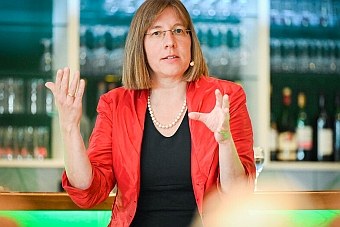
(c) wissenschaft.hessen.de
- Kontakt
-
- Sprechstunde
-
Sprechstunde im WS 24/25: Dienstags 18:00-18:45 Uhr, Raum 201a
Aufgrund des hohen E-Mail-Aufkommens bei Prof. Gawrich wird empfohlen, spezifische Fragen des Studiums
persönlich in der Sprechstunde zu klären.
Sie können während der Sprechzeiten auch anrufen.
Sprechstundenzeiten nach individueller Absprache sind ebenfalls möglich.
In jeder vorlesungsfreien Zeit gibt es Online-Sprechstunden, die jeweils an dieser Stelle angekündigt werden!
- Zuständiges Sekretariat
- Kontakt
- Praktikumsanerkennung im Masterstudiengang Demokratie und Governance
-
Liebe Studierende unseres MA,
hier finden Sie das Anerkennungsformular zur Praktikumsbescheinigung. Bitte fügen Sie Ihren Namen, Ihre Matrikelnummer, das Datum, den Stundenumfang und den Namen des Ausstellers/der Ausstellerin Ihres MA-Zeugnisses in das Formular ein.
Bitte senden Sie den Formular-Entwurf gemeinsam mit Ihren Praktikumszeugnis an Prof. Dr. Andrea Gawrich (andrea.gawrich@sowi.uni-giessen.de und mechthild.lamonica).
Auszug aus der Studienordnung:
„Im Modul M9 besteht die Möglichkeit zur Anrechnung eines fakultativen Praktikums im Umfang von mindestens 300 Stunden.
Anerkannt werden Praktika in Betrieben und anderen Einrichtungen zukünftiger Berufsfelder des Studienganges „Demokratie
und Governance"
In der Regel werden Tätigkeiten in
- Planung und Verwaltung in Bund, Ländern und Gemeinden
- Parlamentarischen Diensten in Bund, Ländern und Gemeinden
- Parteien und Fraktionen in Bund, Ländern und Gemeinden
- Internationalen Dienst und Organisationen
- Verbänden und Interessenvertretungen, Wohlfahrtsverbänden
- Politischen Stiftungen, weitere kulturellen und politische Initiativen
- Einrichtungen der politischen Bildung
- Medien ( Presse, Rundfunk, Fernsehen, Internet)
- Öffentlichkeitsarbeit, PR, Marketing und Werbung
- Markt-, Medien-, und Meinungsforschung
- Politikberatung (Campaining, Public Affairs)
- Non-profit / Third-Sector-Organisationen
- Nichtregierungsorganisationen, auf nationaler und internationaler Ebene (v.a. Organisationen im Bereich Social
Economy, Democracy Assistance, Wahlbeobachtung, Krisenprävention und zivile Konfliktberatung)
- Sozialwissenschaftliche Lehr-und Forschungseinrichtungen
anerkannt.“
Prof. Dr. Andrea Gawrich
- Aktuelles
- Aktuelles
-
Aktuelles
- News
-
Upcoming: Guest-Presentation by Olena Podvorna, PRIF Frankfurt
Die Professur für Internationale Integration mit besonderem Fokus auf das östliche Europa (Prof. Dr. Andrea Gawrich)
lädt zu einem Gastvortrag ein:
Wann: Di. 10. Dezember 2024, 14:15-15:45 Uhr
Wo: Phil II. Haus E, Raum 201 & Online via Zoom
Wer: Dr. Olena Podvorna, Peace Research Institute Frankfur
"A New Role For NATO in the High North after Russia’s War against Ukraine"
Prof Dr Andrea Gawrich, Professor of International Integration with a special focus on Eastern Europe, warmly invites all interested
participants to an open guest lecture organized as part of a tandem-seminar together with Prof Dr Maksym Yakovlyev
for the DAAD-funded „Ukraine Digital" project, in collaboration with NaUKMA, Kyiv.
Dr Olena Podvorna holds a PhD in political science from Maria Curie-Sklodowska-University in Lublin, Poland and, in her research, focusses on Euro-Atlantic Security Cooperation and NATO policy in the Arctic. Since 2023 she holds a position as a senior researcher at PRIF, Frankfurt, where she is involved in a project on the lessons to be learned from the Cold War and Russian aggression against Ukraine. Additionally she leads a project on the role of NATO in the European Arctic and the changes that occur as a result of Russia’s war of aggression.
Zoom-Link: >click<
We are looking forward to seeing you there!

Recap: "Defining Tomorrow’s Research Agenda - International Organizations and Post-2022 Dynamics"
On 13 November, the Chair of International Integration at the Institute of Political Science, in collaboration with the Giessen Graduate Centre (GGS) Section International Organizations & International Law, held a workshop and panel discussion titled Defining Tomorrow’s Agenda: International Organizations and Post-2022 Dynamics.

The workshop featured four presentations by Andreas Kruck (LMU Munich), Janne Mende (Max Planck Institute for Comparative Public Law and International Law), Michael Giesen (University of Potsdam), and Murad Nasibov (JLU Giessen), with comments provided by Falk Ostermann (Kiel University) and Anastasiya Bayok (JLU Giessen). The second part of the event—a panel discussion open to the public—facilitated a lively exchange of ideas on the future of international organisation studies in light of global power shifts, the war in Ukraine, democratic backsliding, and the contestation, crises, and challenges facing the Liberal World Order (CLIO). The discussion also addressed the implications of the recent US elections. The panel served as a platform for fostering meaningful dialogue and contributing to the development of a forward-looking research agenda. In addition to the mentioned speakers, the event was attended by members of the Institute of Political Science and the student community. The hosts—Prof. Dr Andrea Gawrich (Chair) and the Section representatives, Maraike Vandergrift and Murad Nasibov—along with the event participants, expressed their interest in organising similar events in the future.
Event: Defining Tomorrow’s Research Agenda - International Organizations and Post-2022 Dynamics

Panelists:
Andrea Gawrich, JLU Giessen
Andreas Kruck, LMU
Anastasiya Bayok, IFSH
Falk Ostermann, University of Kiel
Janne Mende, Max Planck Institute for Comparative Public Law and International Law
Michael Giesen, University of PotsdamEvent Abstract
The scholarship of the last decade has persistently warned us about the shaping trends in the world from the rising political right, backsliding democracies, resurging autocracies, and the limiting space for civil societies around the world to the forming "political East," manifesting itself institutionally in the Shanghai Cooperation Organization and the BRICS, declining international democracy support agendas and influence, growing challenges to the liberal order and US hegemony from all around the world, and the now peak hitting dissatisfaction of the Global South with its place in, and the design and functioning of, the global governance structures. Nevertheless, we seemed little convinced of how the world had been changing until we had to face the COVID-19 pandemic and related complications, followed by the start of the war in Ukraine and the crisis in Gaza, further complicated by the now ever-prominent US-China rivalry. IO studies cannot remain unreflective of these events, continuing with the “business as usual” research into the general premises of the IO world. No doubt, the above-listed trends
and developments around the world will shape the research agenda of the future as much as the scholarly works of the past and those carried out until recent times. As observed in the past, such extraordinary times often lead to "leaps" or "turns" in the knowledge generation process, contrasting with the gradual and granular accumulative process of the less tumultuous times. To detect and foresee such "leaps" and "turns" in IO studies, the GGS Section "International Organizations and International Law" organises a panel discussion which will provide a chance for the guest researchers to reflect on, and for the audience to engage in debates about, the IO research agenda and its future perspectives.No prior registration is required!
For further information, feel free to contact: Ms. Lidiia Shumska, Lidiia.ShumskaTeam Prof. Gawrich lieferte erste Eindrücke zu den US-Wahlen in einer offenen Panel-Diskussion an der JLU

Prof. Gawrich in der phoenixRunde (31.10.2024) zu den Wahlen Georgien und den politischen Folgen der Ergebnisse

phoenixRunde: Zwischen Putin und Europa - Welchen Weg geht Georgien?
Anke Plättner diskutiert mit:
Sonja Schiffers, Heinrich-Böll-Stiftung Tiflis
Prof. Andrea Gawrich, Sicherheitsexpertin Universität Gießen
Michael Thumann, Die Zeit
Mikheil Sarjveladze, Politologe aus GeorgienDas ganze Gespräch finden sie hier: >click<
Expert:innengespräch zum russischen Angriffskrieg im US Konsulat am 11. Oktober 2024

Lidiia Shumska (Studentische Hilfskraft Prof. Gawrich) und Mavilie Demirdzhaieva (DAAD-Stipendiatin "Zukunft Ukraine") hatten kürzlich die Gelegenheit an einer Expert:innendiskussion im US-Generalkonsulat in Frankfurt am Main teilzunehmen. Dabei trafen sie den amerikanischen Journalisten Terrell Jermaine Starr, der in seinen Arbeiten ausführlich über den Krieg in der Ukraine berichtet.
Im Zentrum der Diskussion stand die Frage nach der Wahrnehmung des russischen Angriffskrieges durch das US-amerikanische Publikum - ein besonderer Fokus lag auf der Wahrnehmung des Krieges durch afro-amerikanische Communities. Gemeinsam beleuchteten die Diskutierenden die Herausforderungen, die durch Desinformation entstehen, und die Rolle, die Rassismus in der öffentlichen Debatte um die Unterstützung der Ukraine spielt.
Link-Tipp: Prof. Dr. Andrea Gawrich im Deutschlandfunk-Interview zu hybrider Kriegsführung im Umfeld von Wahlen sowie dessen Zusammenhang mit pro-europäischen Orientierungen in Moldau, Georgien & Armenien.
"Europa heute" vom 23.10.2024 mit Prof. Gawrich >hier< ab Minute 11:45
Neue Publikation!! >click<

Gawrich, Andrea & Russo, Alessandra (2024): Overlap with contestation? Comparing norms and policies of regional organizations in the post-Soviet space. In: Fawn, Rick; Kluczewska, Karolina; Korneev, Oleg (Hrsg.): EU–Central Asian Interactions: Perceptions, Interests and Practices. 1. Auflage. Abingdon: Routledge.
Delegation von Studierenden aus Armenien, Aserbaidschan und Georgien zu Gast am IfP und GiZO

Die Studierenden der Sozialwissenschaften aus dem Südkaukasus waren zu Gast im Rahmen des Programms „EU4Dialogue“, das vom Büro des Deutschen Akademischen Austauschdienstes (DAAD) in Tblissi eingeworben worden war. Sie nahmen an der 31. Tagung Junger Osteuropa-Expertinnen und -Experten (JOE) teil, die im International Graduate Centre for the Study of Culture (GCSC) der JLU stattfand, sowie am traditionellen Empfang für Gastwissenschaftler und Gastwissenschaftler, zu dem JLU-Präsidentin Prof. Dr. Katharina Lorenz erstmals auf die Freifläche am Theaterlabor im Universitätszentrum eingeladen hatte.
Die Gruppe nahm darüber hinaus unter anderem an Seminaren zur internationalen Sicherheit von Prof. Dr. Andrea Gawrich, Professorin für Internationale Integration (mit besonderem Bezug auf das Östliche Europa) an der JLU, teil und erfuhr Wissenswertes über JLU-Forschungsprojekte. Außerdem konnten die Gäste zahlreiche Eindrücke vom Leben in der Universitätsstadt Gießen und Umgebung mit nach Hause nehmen. Auf dem Besuchsprogramm stand beispielsweise auch ein typischer Studierenden-Kneipenabend.

Foto: JLU / Katrina Friese Die vollständige Pressemitteilung gibt es >hier<
Vielen Dank an alle Teilnehmer:innen für ihr Interesse und ganz besonders auch an Dr. iur. Barbara Janusz-Pawletta für den großartigen und spannenden Vortrag!

Link-Tipp: Prof. Gawrich im Deutschlandfunk-Interview zu den Auswirkungen des sogenannten "Ausländische-Agenten-Gesetz" auf die EU-Georgien Beziehungen
EU-Georgien Beziehungen in der Krise? Interview mit Politologin Andrea Gawrich >click<
Prof. Gawrich auf dem Podium mit dem ehemaligen belgischen Außenminister Jean Asselborn bei einer Veranstaltung der Patriotischen Gesellschaft von 1765 und der Europa-Union Hamburg


© Fotos: Patriotische Gesellschaft von 1765
Everyone join our Guest-Presentation at the Chair!

New Open-Access Publication!! >click<

Gawrich, Andrea; Wydra, Doris (2024): Conditions and Contestation: Ukraine on its Way to EU Membership, In: Knodt, Michelle; Wiesner, Claudia (Hrsg.): The War Against Ukraine an the EU, Cham: Palgrave MacMillan, pp. 161-188
Link-Tipp: Prof. Gawrich im Deutschlandfunk-Interview zur Lage in Georgien
Nachdem Georgien zunächst 2023 den Status als EU-Beitrittskandidat erhalten hat und damit einen guten Schritt in Richtung EU gegangen ist, ließ die Gegenbewegung - mit dem sogenannten "Agentengesetz" nach russischem Vorbild - nicht lange auf sich warten. Die korrespondierenden Massenproteste seien ein gutes Zeichen, dennoch fordert Politologin Andrea Gawrich mehr Druck der EU auf den Staat.
Politologin Gawrich: Die EU muss klar und deutlich reagieren >click<
Europacamp-Veranstaltung zum Thema "Bedrohte Demokratien in Europa" der Hamburger ZEIT-Stiftung, April 2024

Prof. Gawrich auf dem Podium mit dem polnischen Vize-Außenminister Marek Prawda Event during the "Europa-Woche" at JLU, Join here <- click, see passcode below
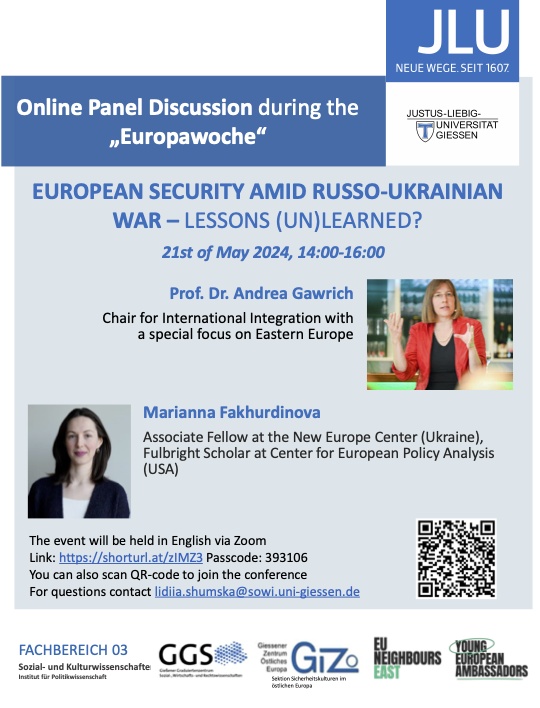
Link-Tipp: Prof. Gawrich im Interview - Spionage: Demokratie als ein "systemischer Rivale" | MDR.DE
Westliche Demokratien sind autokratischen Mächten ein Dorn im Auge. Warum Deutschland ins Interesse gerückt ist und wie es um die derzeitige Bedrohungslage steht, erklärt die Politikwissenschaftlerin Andrea Gawrich.
Murad Nasibov, Finn Freund and Prof. Dr. Andrea Gawrich at a Workshop organized by Prof. Dr. Alexander Libman at FU Berlin for the DFG-Project "Understanding Eurasian Regionalism"
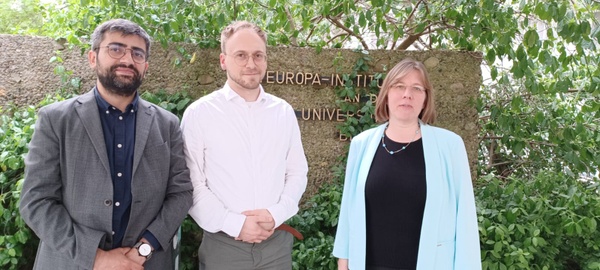
Among the attendees were Richard Sawka, Filippo Costa Buranelli, Tom Casier, Christopher Hartwell, Regina Heller, Igor Davidzhon, and others.
SHAPEDEM-EU in ECPR Joint Workshop Sessions with Sister Projects EMBRACE and REDEMOS
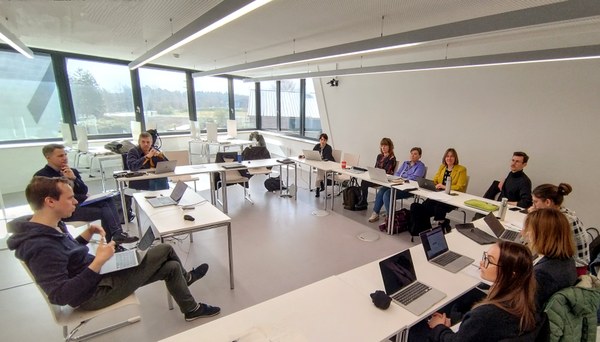
SHAPEDEM-EU joined its Horizon sister projects EMBRACE and REDEMOS in a joint workshop session of the European Consortium for Political Research in Lüneburg, Germany 25-28 March. The workshop, titled “Supporting and Promoting Democracy in the European Union’s Neighbourhood“, welcomed contributions from project partners, including Prof Dr Andrea Gawrich’s co-authored paper with Lea Konrad on “Gender Equality, Democracy Support and Security in the EU’s neighbourhood policies”, Prof Gawrich’s co-authored paper with Murad Nasibov, “EU-Energy Policy with the EU’s Neighbourhood. An obstacle to democratic practices between the EU and the EaP countries?” as well as Dr Jan Grzymski’s presentation of a paper titled, “Changing patterns of contestation of democracy support in the EU. Comparative analysis of EU member states’ practices in EU democracy support”, co-authored with Małgorzata Maria Fijał, Magdalena Gora, Volodymyr Posviatenko, Ewa Szczepankiewicz, Katarzyna Zielinska and Marcin Zubek. In addition to discussions on SHAPEDEM-EU’s submissions, the participants engaged in lively exchanges on the interim results of the three sister projects and the outlook for EU democracy support in the Eastern and Southern Neighbourhoods.
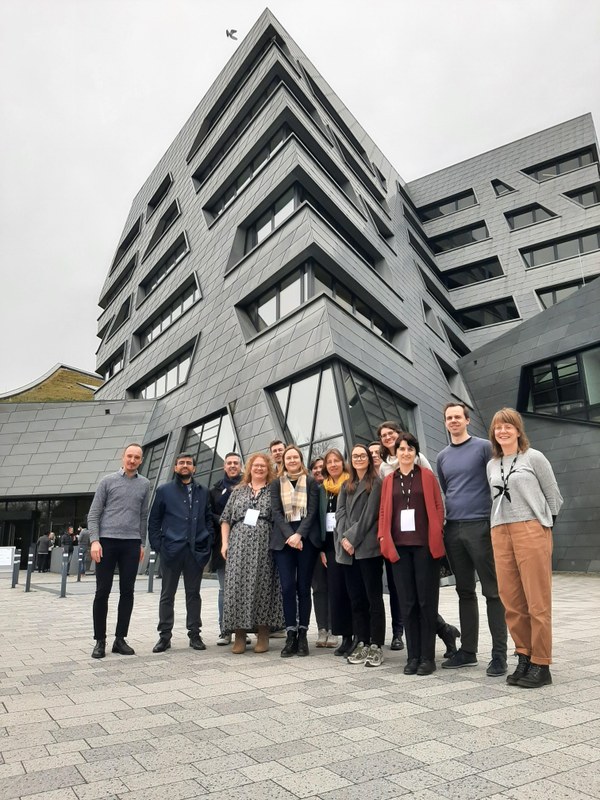
Tired but packed with new ideas and great input from SHAPEDEM-EU's sister projects REDEMOS and EMBRACE after the Workshop »Supporting & Promoting Democracy in the EU's Neighborhood« held at ECPR 2024 hosted by Leuphana University Lüneburg.
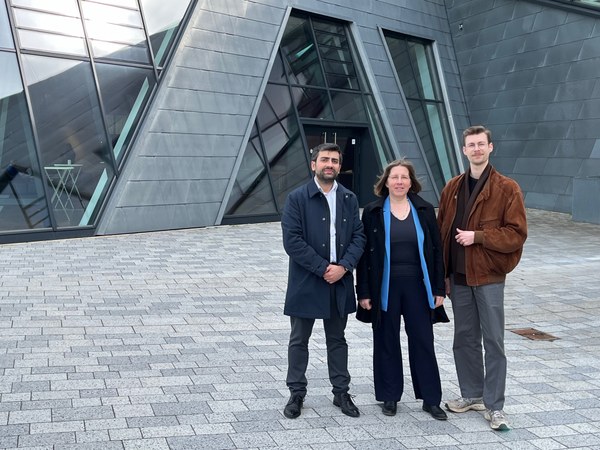
Murad Nasibov, Prof. Andrea Gawrich, Per Thomsen Success! Thank you to all participants for their valuable contributions to the workshop and the fruitful discussions!
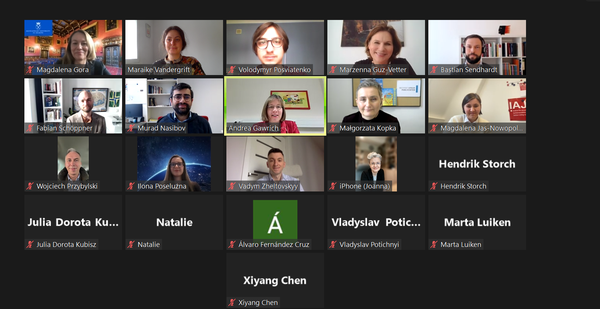
WORKSHOP 18.3.24: Common New Agendas in turbulent International Environments - German and Polish Approaches towards the Eastern Partnership Region; for information on the program please contact: maraike.vandergrift
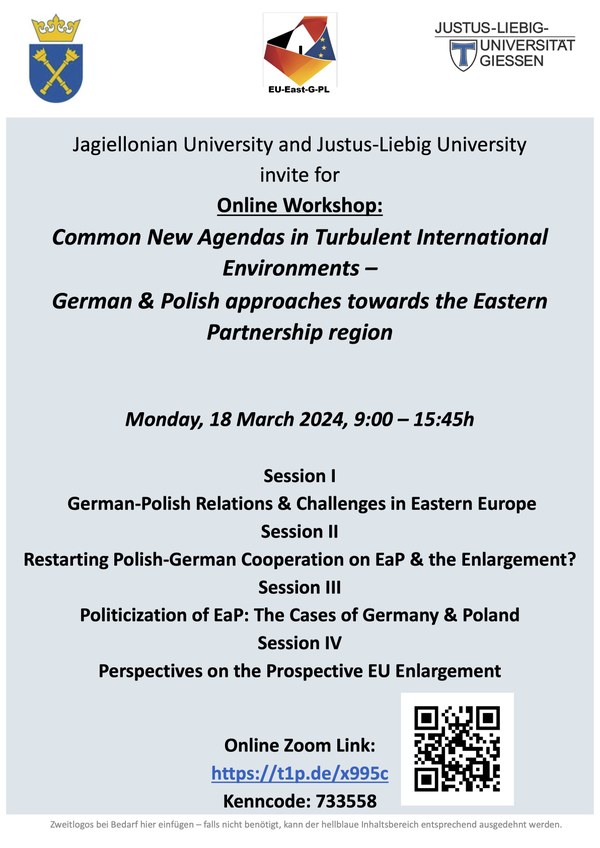
for additional information please contact: maraike.vandergrift@sowi.uni-giessen.de NEWLY OUT: Gawrich, Andrea; Nasibov, Murad (2024): EAEU and other post-Soviet integration Organizations. In: Libman, Alexander; Vinokurov, Evgeny (Hrsg.): Elgar Companions to International Organisations. The Elgar Companion to the Eurasian Economic Union (pp. 162-175), Edward Elgar Publishing.
Neuer Wissenschaftspodcast mit Prof. Dr. Andrea Gawrich "Die Auswirkungen des russischen Angriffskriegs gegen die Ukraine auf die EU" --- jetzt hören: https://www.hessen-schafft-wissen.de/artikel/podcast-andrea-gawrich oder bei Spotify: https://open.spotify.com/episode/3UZmpJadCNIzzfDYTsce1a?si=zmuC6lryRYyJ2cuyJUsGSA
Prof. Gawrich nach einer Podiumsdiskussion beim Café Kyiv 2024 in Berlin, mit dem ukrainischen Botschafter Oleksij Makejew, dem Vorsitzenden des Dachverbandes Ukrainischer Organisationen in Deutschland, Rostyslav Sukennyk, und dem ukrainischen JLU-Studierenden Vladyslav Hulievych
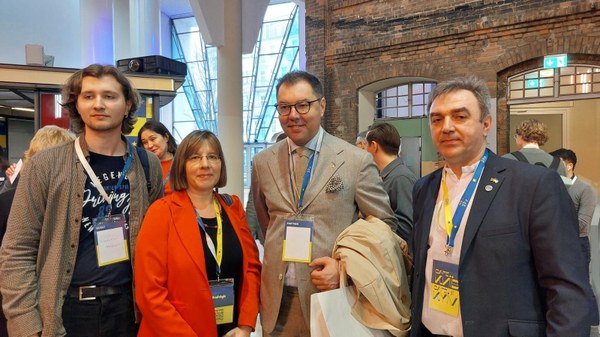
Am Mittwoch, den 24.01.24, veranstaltet die Professur für Internationale Integration mit besonderem Fokus auf das östliche Europa (Prof. Dr. Andrea Gawrich) eine Online-Debatte zur anstehenden EU-Parlamentswahl. Thema wird hauptsächlich die Möglichkeit einer Verschiebung der Machtverhältnisse Richtung "Rechts" von dem Hintergrund erstarkter rechtspopulistischer Parteien in vielen EU Mitgliedsstaaten sein.
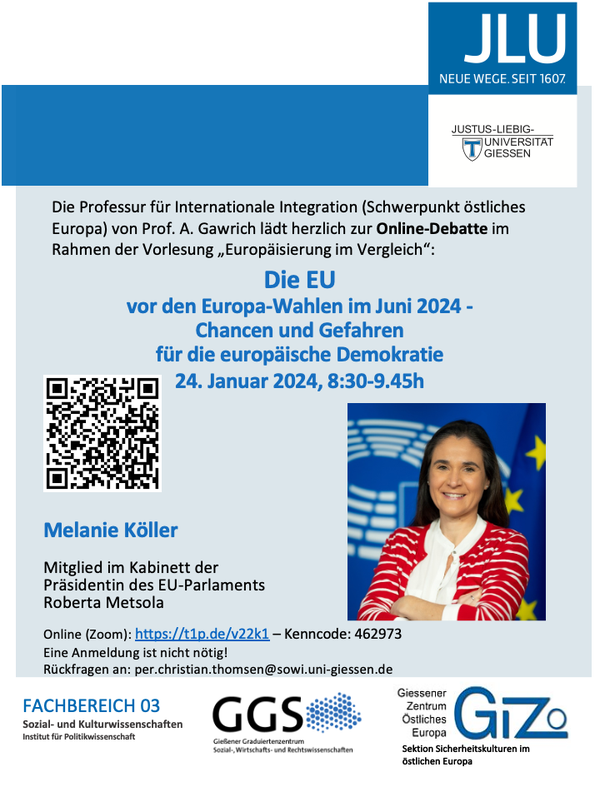
Alle Interessierten sind herzlich eingeladen zum öffentlichen Promotionskolloquium der Professur für Internationale Integration mit besonderem Fokus auf das Östliche Europa
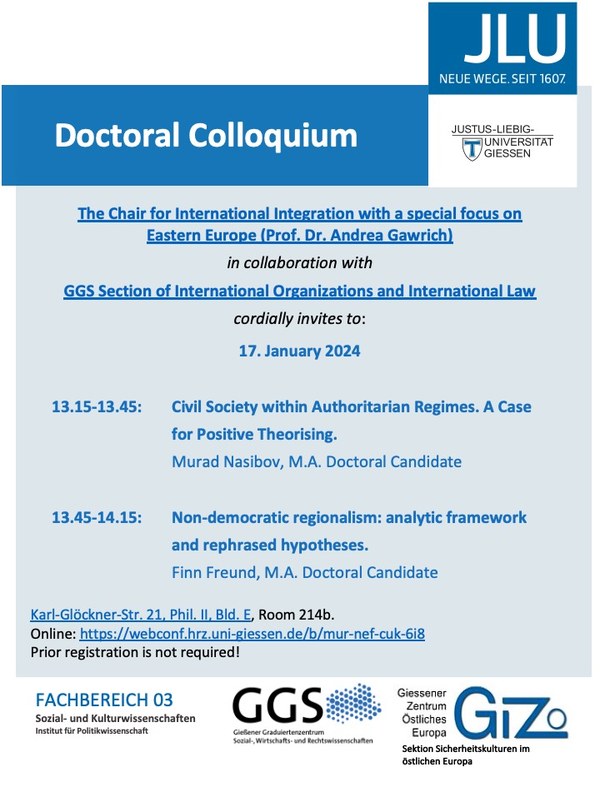
Neuer Aufsatz in der integration: Gawrich, Andrea; Wydra, Doris (2023): Perspektiven der Erweiterung - ein Versprechen, multiple Szenarien, In: integration 46(3), S. 229-43, DOI: https://doi.org/10.5771/0720-5120-2023-3-229
Prof. Dr. Andrea Gawrich wurde zum Mitglied des wissenschaftlichen Direktoriums des Instituts für Europäische Politik, Berlin, gewählt (https://iep-berlin.de/)

Neuerscheinung eines Sammelbandbeitrages
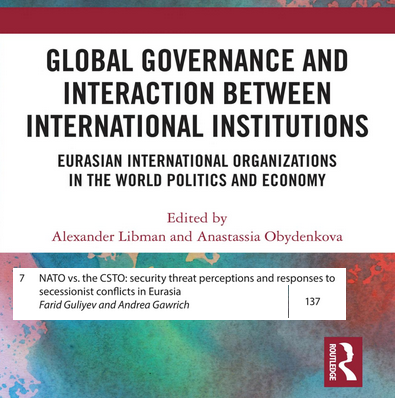
DGfP Jahrestagung 2023: "Politikwissenschaft in der Zeitenwende"
Oliver Eberls Buch „Naturzustand und Barbarei“ erhält Preis „Das politikwissenschaftliche Buch“ für das Jahr 2022
Kiel/Berlin, Juni 2023. Am 23. Juni überreichten Prof Dr. Andrea Gawrich, DGfP-Vorsitzende, und Dr. Astrid Kuhn, Vorstandsvorsitzende der SW&D, im Rahmen der Jubiläumstagung zum 40-jährigen Bestehen der DGfP in Berlin, die Auszeichnung „Das politikwissenschaftliche Buch“ für das Jahr 2022 an PD Dr. Oliver Eberl für seine Monografie „Naturzustand und Barbarei“. Zum zweiten Mal vergaben die DGfP und die SW&D gemeinsam diesen Preis zur Stärkung der Monografie als Publikationsformat innerhalb der Politikwissenschaft. Die Buchpreis-Jury wählte aus allen Einsendungen Oliver Eberls Buch „Naturzustand und Barbarei. Begründung und Kritik staatlicher Ordnung im Zeichen des Kolonialismus“ aus. Bei dieser äußerst dichten Habilitationsschrift des Darmstädter Politikwissenschaftlers handelt es sich um eine klassische ideengeschichtliche Arbeit, die zugleich Anknüpfungspunkte an aktuelle Forschungsdiskurse anderer (Sub-)Disziplinen der Politikwissenschaft bietet und damit breitere Diskursräume öffnet.
Weiterhin begründet die Jury ihre Entscheidung für diese Monografie: „So augenscheinlich es sein mag, dass die Vorstellung von „Barbarei“ in der europäischen Geschichte mit dem Kolonialismus eng verbunden war, legt Eberls Buch indes dar, wie auch im „Naturzustand“ – als scheinbar neutralem Zwillingsausdruck der politischen Theoriesprache vertragstheoretischer Staatsbegründung – problematische koloniale Denkmuster fortleben. Damit löst er nicht nur seinen hohen und zweifelsohne zeitgemäßen theoretischen Anspruch ein, die politische Theorie zu dekolonisieren. Mit seinem elegant formulierten Buch, das die ebenso einnehmende wie exakte Phantasie ideenhistorischer Erzählkunst mit gründlicher systematischer Analyse bestens verbindet, liefert Eberl einen substanziellen Beitrag, der – so die Überzeugung der Jury – zu einem Referenzpunkt in der aktuellen, öffentlich und teils kontrovers geführten Debatte werden wird.“
Die Jubiläums-Tagung der DGfP stellte mit dem Thema „Politikwissenschaft in der Zeitenwende“ den perfekten Rahmen für die Preisübergabe dar.
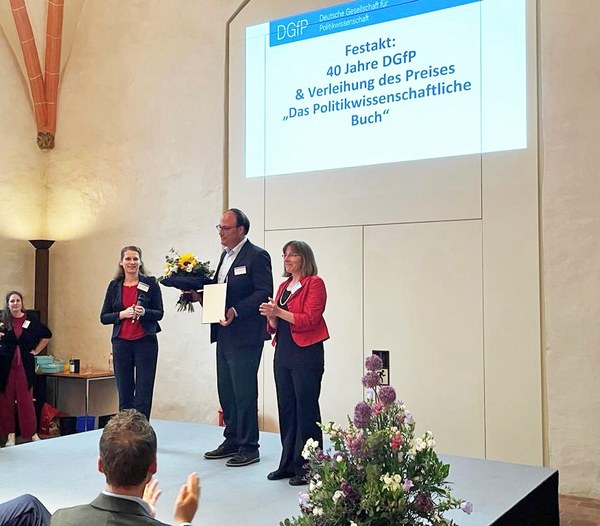
Polens Verhältnis zu Nachbarn: Neues außenpolitisches Selbstbewusstsein
Professur Gawrich-Team 2022
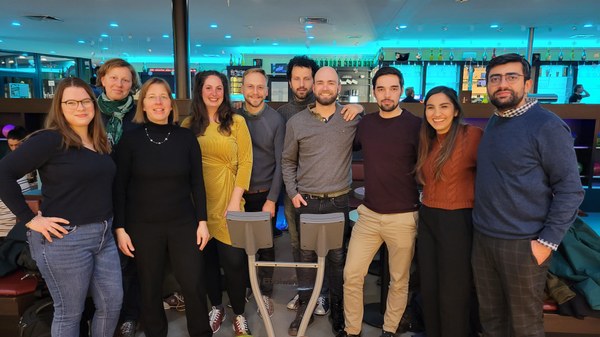
Andrea Gawrich am 13.07.2022 in Herborn
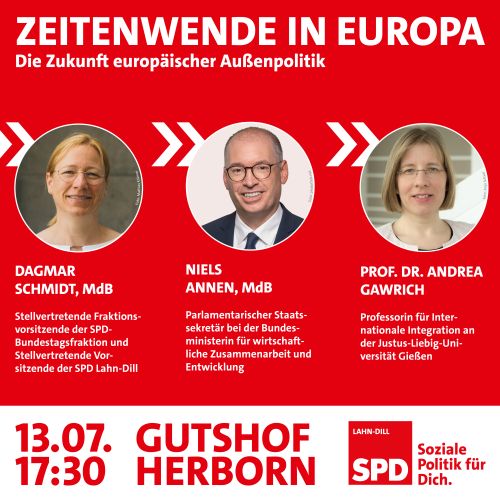
Mischa Hansel (IFSH Hamburg) zu Besuch an der Professur von Andrea Gawrich am 05. Juli 2022
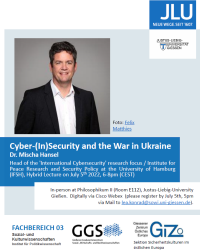

Prof. Dr. Anja Jetschke zu Besuch an der Professur von Andrea Gawrich am 20. Juni 2022

Prof. Dr. Andrea Gawrich in den Medien zum Ukraine-Krieg
- Erfolgreicher Promotionsabschluss zum Thema „Deutscher Einfluss auf die EU-Russlandpolitik“ - Disputation von Liana Fix im Oktober 2019
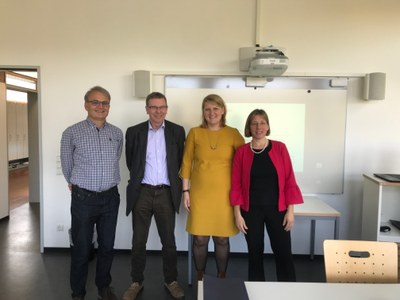
- Einladung zum Gastvortrag von Simon Bulmer (University of Sheffield); Germany and the EU: Europe's reluctant hegemon? (21.10.19, 18:00 Uhr, Raum E119, Phil. II, Karl-Glöckner-Str. 21E)
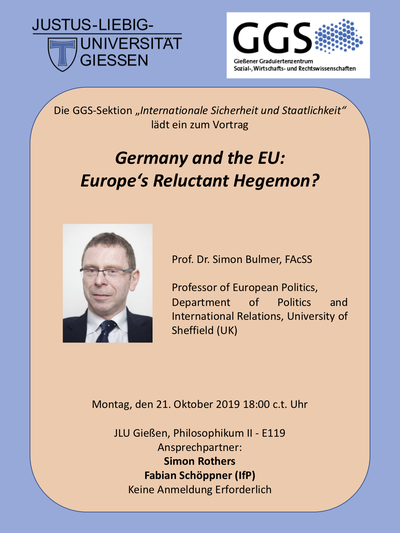
- Bekanntgabe der MAP5 Klausur/Announcement for the MAP5-Exam (Dr. Lusine Badalyan): The exam will take place on 16th October 2019 between 14-16 in room E 112.
- Einladung zum Gastvortrag von Dr. Thomas Pfeiffer (Ministerium für Inneres und Kommunales des Landes NRW - Abteilung Verfassungsschutz) am 25.06.2019, 16:00-18:00 Uhr: "Rechtsextremismus als Erlebniswelt: Musik, Symbolik, Bildsprache". Raum 008, Haus D, Phil II.

- Einladung zum Gastvortrag von Dr. Tom Casier (University of Kent) am 14.01.2019: EU-Russia Relations - A way out?

- Vortrag von Dr. Laure Delcour (College of Europe) - 11.12.2018: EU policy transfer, domestic responses and Russia’s policies in Eastern Partnership countries

- Einladung zum Gastvortrag Prof. Dr. Laure Delcour: EU policy transfer, domestic responses and Russia’s policies in Eastern Partnership countries

- Neuerscheinung eines Artikels: Axyonova, Vera/Gawrich Andrea (2018): Regional Organizations and Secessionist Entities: Analysing Practices of the EU and the OSCE in Post-Soviet Protracted Conflict Areas. In: Berg, Eiki/Ker-Lindsay, James(Hrsg.): The Politics of International Interaction with de facto States. London, Routledge
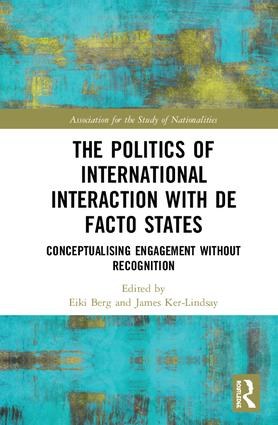
- Deutsche Forschungsgemeinschaft fördert das Projekt „EaP_Diplo“ an der Universität Gießen mit rund 445.000 Euro
Die Analyse außenpolitischer Entscheidungen der Ukraine, Georgiens und der Republik Moldau gegenüber der Europäischen Union steht im Mittelpunkt eines neuen Forschungsprojekts an der Justus-Liebig-Universität Gießen (JLU), das die Deutsche Forschungsgemeinschaft (DFG) fördert. Geleitet wird das Projekt „Domestic Preferences and EU Cooperation – Explaining Foreign Policies in Ukraine, Georgia and Moldova. A Two-LevelGame Analysis“ („EaP_Diplo“) von Prof. Dr. Andrea Gawrich, Gießener Zentrum Östliches Europa (GiZo) und Institut für Politikwissenschaft der JLU, sowie Dr. Vera Axyonova, Institut für Politikwissenschaft. Die DFG fördert es mit insgesamt rund 445.000 Euro für drei Jahre. „Dieses Projekt stärkt die hervorragende Osteuropaforschung an der JLU weiter“, so JLUPräsident Prof. Dr. Joybrato Mukherjee. „Gerade in politisch schwierigen Zeiten sind Forschungsprojekte wie dieses wichtig für die Völkerverständigung und den interkulturellen Austausch. Ich gratuliere allen Beteiligten herzlich zu diesem Erfolg.“ Die Wissenschaftlerinnen und Wissenschaftler konzentrieren sich in „EaP_Diplo“ auf jene Länder, die – trotz politischen Drucks der russischen Regierung – ein Assoziierungsabkommen mit der EU geschlossen haben und als Spitzenreiter unter den sechs Ländern der östlichen Partnerschaft der EU gelten. Hinsichtlich der Annäherung an EU-Standards während der verschiedenen Phasen der Implementation der östlichen Partnerschaft zeigt sich in diesen drei Ländern eine große Varianz. Diese Varianz soll in einer umfassenden Analyse der innenpolitischen Präferenzbildung erklärt werden. „Mit dem Projekt ‚EaP_Diplo‘ möchten wir die Forschungslücke in der theoriegeleiteten und methodologisch fundierten Außenpolitikanalyse postsowjetischer Staaten schließen“, so Prof. Gawrich. „Zudem entwickeln wir die Außenpolitikanalyse für nicht-konsolidierte Demokratien bzw. hybride Regime weiter. Bislang ist diese vor allem auf konsolidierte Demokratien angewendet worden.“ Stand bis dato meist die EU-Politik gegenüber den östlichen EU-Nachbarn im Vordergrund, so lenken die Forscherinnen und Forscher nun den Blick auf die Außenpolitik der osteuropäischen EU-Nachbarn. Das Projekt erweitert nicht zuletzt die Bandbreite an Länderstudien der östlichen Partnerschaft, indem es eine grundlegende Analyse der innenpolitischen Präferenzbildung zur Außenpolitik unternimmt.
- Vortrag von Dr. Tatiana Kyselova (Kyiv-Mohyla Academy): Conflict Transformation without Conflict Resolution? Track III Dialogues in Ukraine. - 16.05.2018

- Neues DFG-Projekt von Prof. Gawrich und Dr. Axyonova:
Im August 2017 wurde das Projekt "Domestic Preferences and EU Cooperation - Explaining Foreign Policies in Ukraine, Georgia and Moldova. A Two-Level-Game Analysis" durch die DFG bewilligt.
Laufzeit des Projektes: 3 Jahre.
Abstract:
The paramount objective of this research project is to perform a comprehensive Foreign Policy Analysis (FPA) of the foreign policy choices in Ukraine, Georgia and Moldova vis-à-vis the EU. Hence, the project focuses on those countries, which have signed an Association Agreement with the EU, despite pressure from Russia, and are to be regarded as frontrunners among the six Eastern Partnership (EaP) countries. However, approximation to EU legal standards demonstrates a high degree of variance throughout various phases of EaP implementation in these three countries, which will be explained in a comprehensive analysis of domestic preference building. The innovative contribution of this project consists in, first,(partly) filling the research gap of theory based and methodologically sound FPA on post-Soviet states. Second, in adapting suitable FPA approaches (principally the Two-Level-Game approach), which had previously been applied to consolidated democracies, to the analysis of non-consolidated democratic or hybrid regimes, thus advancing FPA on such regime types. Third, in expanding the scope of EaP country studies by undertaking a substantial analysis of domestic preference building in the three countries’ foreign policies, instead of focusing solely on the EU’s policies vis-à-vis these states.
- Neuerscheinung: Gawrich, Andrea/Knelangen, Wilhelm (Hrsg.): Globale Sicherheit und die Zukunft politischer Ordnungen, Barbara Budrich Verlag 2017
- Neuerscheinung: Russo, Alessandra; Gawrich, Andrea: Overlap with contestation? Comparing norms and policies of regional organizations in the post-Soviet space, in: Central Asian Survey, 2017, doi: http://dx.doi.org/10.1080/02634937.2017.1281222
 .
.

- Neuerscheinung: Gawrich, Andrea: Die OSZE in Zentralasien. Eine problematische Beziehung, in: Zentralasien-Analysen Nr.112-113, 26-05-2017, S. 2-5.

- Neuerscheinung: Gawrich, Andrea: Inter-organizational Relations in the Field of Democratization: The European Union, the OSCE, and the Council of Europe, in: The Palgrave Handbook of Inter-organizational Relations in World Politics, hrsg. von Rafael Biermann, Joachim A. Koops, London, Palgrave Macmillan 2016.
- Tagung
The Future of Eastern Europe and South Caucasus: at the intersection of foreign policy, security and business
Im Rahmen des vom Deutschen Akademischen Austauschdienstes und dem Auswärtigen Amt geförderten Projekts „Eastern Partnership Security Dialogue“ fand am 1. und 2. November 2016 die Tagung The Future of Eastern Europe and South Caucasus: at the intersection of foreign policy, security and business in Minsk, Belarus statt. Die Tagung wurde durch die Zusammenarbeit der Professur für Internationale Integration, der Belarussischen Staatlichen Universität und dem Liberal Club Belarus ermöglicht. Im Zentrum der Konferenz, an der namhafte Expert_innen aus 8 Ländern teilnahmen, standen nationale, regionale sowie externe Perspektiven auf aktuelle Probleme in Osteuropa und dem Südkaukasus sowie eine gründliche SWOT-Analyse der beiden Regionen im System der internationalen Beziehungen auf dem europäischen Kontinent.
Team
- Wissenschaftliche Mitarbeiter:innen
- Lea Konrad
-
Wissenschaftliche Mitarbeiterin
an der Professur für Internationale Integration mit besonderem Bezug auf das Östliche Europa
- Kontakt
- Murad Nasibov
-
Wissenschaftlicher Mitarbeiter
an der Professur für Internationale Integration mit besonderem Bezug auf das Östliche Europa
- Kontakt
- Fabian Alexander Schöppner
-
Wissenschaftlicher Mitarbeiter
am Institut für Politikwissenschaft
- Kontakt
- Maraike Nicole Vandergrift
-
Wissenschaftliche Mitarbeiterin
an der Professur für Internationale Integration mit besonderem Bezug auf das Östliche Europa
- Kontakt
-
Philosophikum II Raum E217b
- Doktorand:innen
- Edith Ruvalcaba Galindo
-
Doctoral Candidate at the Professorship for International Integration
- Fadi Bezkadi
-
Doktorand an der Professur für Internationale Integration
- Kontakt
- Finn Freund
-
Doktorand an der Professur für Internationale Integration
- Studentische Hilfskräfte
- Studentische Hilfskräfte
-
- Per Christian Thomsen per.christian.thomsen@sowi.uni-giessen.de
- Lidiia Shumska lidiia.shumska@sowi.uni-giessen.de
- Vladyslav Hulievych vladiyslav.hulievych
Raum E 217b, Tel.: 0641 99-23138
- Ehemalige
- Ehemalige
-
Informationen folgen
CV
- Lebenslauf
-
Wissenschaftlicher Werdegang
Seit 10/2012
Professur für Politikwissenschaft mit dem Schwerpunkt Internationale Integration an der Justus-Liebig-Universität Gießen.
10/2011-
9/2011
Privatdozentin im Range einer Akademischen Rätin am Institut für Sozialwissenschaft, Fach Politikwissenschaft der Christian-Albrechts-Universität zu Kiel.
SS 2011
Venia Legendi für das Fach Politikwissenschaft an der CAU Kiel und Abschluss des Habilitationsverfahrens mit einer Schrift über "Strategien der Demokratieförderung in Europarat und OSZE – no carrots and no sticks"
2008-2011
2003-2007
Wissenschaftliche Assistentin am Institut für Sozialwissenschaft, Fach Politikwissenschaft der CAU Kiel.
2009-10
Projektleitung: Demokratisierung durch nichtmilitärische NATO-Kooperation? Zur Rolle der NATO in postsozialistischen Staaten.
10/2006-
06/2010
Projektleitung im EU-geförderten Projekt "EU Eastern Neighbourhood: Economic Potential and Future Development" (ENEPO), gem. mit dem Institut für Weltwirtschaft.
7/2005-
12/2010
Projektleitung des VW-Projekt "Political and Economical Challenges of Resource-Based Development in Aserbaijan and Kazakhstan", Universität Kiel gemeinsam mit dem Institut für Weltwirtschaft, Kiel. Erarbeitung und empirische Überprüfung des Modells eines "Post-Sowjetischen Rentierstaates".
4/2009-
9/2009
Vertretungsprofessorin für Politikwissenschaft an der Universität Duisburg-Essen.
10/2007-
9/2008
Vertretungsprofessur für Politikwissenschaft an der Christian-Albrechts-Universität zu Kiel.
5/2005-
5/2006
Associate Fellow der Deutschen Gesellschaft für Auswärtige Politik (DGAP), Berlin.
3/2004
Eurofaculty-Gastdozentur (DAAD) an der Universität Tartu/Estland
4/2002 -
4/2003
Leiterin der Arbeitsstelle Ostmitteleuropa des Forschungsinstituts der Deutschen Gesellschaft für Auswärtige Politik (DGAP), Berlin.
1/2002
Promotion zur Dr. rer. soc. an der Fakultät für Sozialwissenschaft der Ruhr-Universität Bochum. Thema der Dissertation Ethnische Minderheiten im Transformations- und Konsolidierungsprozess Polens. Verbände und politische Institutionen (Erstgutachter Prof. Dr. Wilhelm Bleek, Zweitgutachter Prof. Dr. Ulrich Widmaier).
11/2001 -
4/2002
Wiss. Mitarbeiterin im Anschubförderungsprojekt zum Thema "Strategien der Umweltpolitik in jungen Demokratien: Osteuropa und Lateinamerika im Vergleich", Ruhr-Universität Bochum.
seit 9/2000 -
3/2005
Mitglied in der interdisziplinären Projektgruppe "Menschenrechte und Minderheitenschutz" der Deutschen Kommission Justitia et Pax
11/1999 -
10/2001
Wiss. Mitarbeiterin im VW-Forschungsprojekt über "Ethnische Minderheiten und der Transformationsprozess in Polen", Ruhr-Universität Bochum
3/1999
DAAD-Forschungsstipendium für Polen.
7/1999
Bewilligung eines Promotionsstipendiums des Cusanuswerkes.
7/1997 -
10/1999
Wissenschaftliche Mitarbeiterin an der Fakultät für Sozialwissenschaft, Lehrstuhl Politikwissenschaft I (Prof. Dr. Wilhelm Bleek) an der Ruhr-Universität Bochum.
1997
Magisterarbeit bei Prof. Dr. Hans Mommsen über "Widerstand in den Ghettos von Warschau und Bialystok", Fakultät für Geschichtswissenschaft, Ruhr-Universität Bochum
9-10/1993
Aufenthalt am Institut für Polnische Sprache und Kultur der Universität Breslau, Polen
1989-1997
Studium der Neueren Geschichte, Sozial- und Wirtschaftsgeschichte im Hauptfach. Studium der Politologie und Sozialökonomie als Nebenfächer an der Ruhr-Universität Bochum
Mitgliedschaften
- Deutsche Vereinigung für Politische Wissenschaft (DVPW)
- Deutsche Gesellschaft für Osteuropakunde (DGO),
- Deutscher Hochschulverband (DHV)
- Deutsche Gesellschaft für Politik (DGfP).
Publikationen
- Publikationen
-
Die Professur für Internationale Integration mit besonderem Bezug auf das Östliche Europa hat eine neue Policy-Paper-Reihe "Eurasia Global Policy Brief" gestartet.
03/2022 Eurasia Global Policy Paper No. 1 / 11 March 2022 Title: Russia's Invasion of Ukraine: Reactions from IOs and other Key Regional Actors. Global and Regional Implications (Lea Konrad, Murad Nasibov, Fabian Schöppner, Andrea Gawrich)
International Journal Publications (peer reviewed)
2023 Gawrich, Andrea; Wydra, Doris (2023): Perspektiven der Erweiterung - ein Versprechen, multiple Szenarien, In: integration 46(3), S. 229-43, DOI: https://doi.org/10.5771/0720-5120-2023-3-229 2023 Rabinovych, Maryna; Gawrich, Andrea (2023): The Conflict in Eastern Ukraine and International Support for the Decentralization Reform (2014–2022): Theory-Guided Observations. In: East European Politics and Societies 37(3), S. 1036-58 DOI: 10.1177/08883254221139841. 2021 Guliyev, Farid; Gawrich, Andrea (2021): OSCE mediation strategies in Eastern Ukraine and Nagorno-Karabakh: a comparative analysis. In: European Security, S. 1–20. DOI: 10.1080/09662839.2021.1900121. 2021 Andrea Gawrich; Vera Axyvonova; Brigitte Weiffen (2021): Reorganizing the Neighborhood? Power Shifts and Regional Security Organizations in the Post-Soviet Space and Latin America. In: Journal of Global Security Studies 6 (1). DOI: 10.1093/jogss/ogz080. 2020 Vera Axyonova; Denis Cenusa; Andrea Gawrich (2020): International Negotiations and Domestic Change in the EU’s Eastern Neighborhood: Deconstructing Antidiscrimination Reforms in Moldova. In: East European Politics and Societies, 088832542096891. DOI: 10.1177/0888325420968911. 2020 Guliyev, Farid; Gawrich, Andrea (2020): NATO vs. the CSTO: security threat perceptions and responses to secessionist conflicts in Eurasia. In: Post-Communist Economies 33 (2-3), S. 283–304. DOI: 10.1080/14631377.2020.1800316. 2019 Liana Fix; Andrea Gawrich; Kornely Kakachina; Alla Leukavets (2019): Out of the shadow? Georgia’s emerging strategies of engagement in the Eastern Partnership: between external governance and partnership cooperation. In: Caucasus Survey 7 (1), S. 1–24. DOI: 10.1080/23761199.2018.1541218. 2018 Vera Axyonova; Andrea Gawrich (2018): Regional Organizations and Secessionist Entities: Analysing Practices of the EU and the OSCE in Post-Soviet Protracted Conflict Areas. In: Ethnopolitics 17 (4), S. 408–425. DOI: 10.1080/17449057.2018.1495358. 2017 Alessandra Russo; Andrea Gawrich (2017): Overlap with contestation? Comparing norms and policies of regional organizations in the post-Soviet space. In: Central Asian Survey 36 (3), S. 331–352. DOI: 10.1080/02634937.2017.1281222. 2014 Andrea Gawrich (2014): Emerging from the Shadows – The Ukrainian-Russian Crisis and the OSCE's Contribution to the European Security Architecture. In: Die Friedens-Warte: Journal of International Peace and Organization 89 (1-2), S. 59–80. 2013 Tobias Debiel; Andrea Gawrich (Hg.) (2013): (Dys-)functionalities of corruption. Comparative perspectives and methodological pluralism. Wiesbaden: Springer VS (Zeitschrift für Vergleichende Politikwissenschaft, Suppl. 1 (2013)). 2010 Anja Franke; Andrea Gawrich; Inna Melnykovska; Rainer Schweickert (2010): The European Union's Relations with Ukraine and Azerbaijan. In: Post-Soviet Affairs 26 (2), S. 149–183. DOI: 10.2747/1060-586X.26.2.149. 2010 Andrea Gawrich; Inna Melnykovska; Rainer Schweickert (2010): Neighbourhood Europeanization through ENP: The Case of Ukraine. In: JCMS: Journal of Common Market Studies 48 (5), S. 1209–1235. DOI: 10.1111/j.1468-5965.2010.02110.x. 2009 Anja Franke; Andrea Gawrich; Gurban Alakbarov (2009): Kazakhstan and Azerbaijan as Post-Soviet Rentier States: Resource Incomes and Autocracy as a Double ‘Curse’in Post-Soviet Regimes. In: Europe-Asia Studies 61 (1), S. 109–140. DOI: 10.1080/09668130802532977. 2006 Andrea Gawrich (2006): Die EU-Minderheitenpolitik und die EU -Erweiterungsprozesse. In: ZPol 16 (2), S. 487–504. DOI: 10.5771/1430-6387-2006-2-487. 2003 Andrea Gawrich (2003): Ein Votum für den EU-Beitritt? Die jüngsten Parlamentswahlen in Polen, Ungarn und Tschechien. In: Zeitschrift für Parlamentsfragen (2), S. 270–284. Monographs
2014 Andrea Gawrich (2014): Demokratieförderung in Europarat und OSZE. Ein Beitrag zur europäischen Integration. Wiesbaden: Springer VS. 2014 Ute Becker; Andrea Gawrich; Ulrich Widmaier (2014): Regierungssysteme Zentral- und Osteuropas. Ein einführendes Lehrbuch. Aufl. 1999. Opladen: Leske + Budrich (Lehrtexte Politik). 2007 Wilhelm Bleek; Andrea Gawrich; Kurt Sontheimer (2007): Grundzüge des politischen Systems Deutschlands. Völlig überarb. Neuausg. München, Zürich: Piper (Piper, 5148). 2006 Andrea Gawrich; Wulf-W. Lapins (2006): Demokratieförderung als europäische Herausforderung. Perspektiven für die östlichen Nachbarländer der EU. [Electronic ed.]. Berlin: Friedrich-Ebert-Stiftung, Abt. Internat. Dialog. 2003 Andrea Gawrich (2003): Minderheiten im Transformations- und Konsolidierungsprozess Polens. Verbände und politische Institutionen. Wiesbaden: VS Verlag für Sozialwissenschaften (Politikwissenschaftliche Paperbacks, Studien und Texte zu den politischen Problemfeldern und Wandlungstendenzen westlicher Industriegesellschaften, 35). Publications in International Edited Volumes
2024 Gawrich, Andrea & Russo, Alessandra (2024): Overlap with contestation? Comparing norms and policies of regional organizations in the post-Soviet space. In: Fawn, Rick; Kluczewska, Karolina; Korneev, Oleg (Hrsg.): EU–Central Asian Interactions: Perceptions, Interests and Practices. 1. Auflage. Abingdon: Routledge.2024 Gawrich, Andrea; Wydra, Doris (2024): Conditions and Contestation: Ukraine on its Way to EU Membership, In: Knodt, Michelle; Wiesner, Claudia (Hrsg.): The War Against Ukraine an the EU, Cham: Palgrave MacMillan, pp. 161-188, DOI: https://doi.org/10.1007/978-3-031-35040-5 2024 Gawrich, Andrea; Nasibov, Murad (2024): EAEU and other post-Soviet integration organizations, Chapter 12, in: Libman, Alexander; Vinokurov, Evgeny (Hrsg.): Elgar Companions to International Organisations. The Elgar Companion to the Eurasian Economic Union Edited, Cheltenham: Edward Elgar Publishing, pp. 162-175. 2024 Gawrich, Andrea; Guliyev, Farid (2024): NATO vs. the CSTO: security threat perception and responses seccecionist conflicts in Eurasia. In: Libman, Alexander; Obydenkova, Anastassia (Hrsg.): Global Governance and Interaction between International Institutions - Eurasian International Organizations in the World Politics and Economy, 1. Auflage, New York: Routledge, S. 137-58, DOI: 10.4324/9781003438892. 2020 Andrea Gawrich (2020): Conflict Management, International Parliamentary Assemblies and Small States: The cases of Georgia and Moldova. In: Anja Mihr (Hg.): Transformation and Development. Studies in the Organization for Security and Cooperation in Europe (OSCE) Member States. 1st ed. 2020. Cham: Springer International Publishing; Imprint Springer. 2019 Andrea Gawrich (2019): Regional Organizations and Secessionist Entities: Analysing Practices of the EU and the OSCE in Post-Soviet Protracted Conflict Areas. In: Eiki Berg und James Ker-Lindsay (Hg.): The politics of international interaction with de facto states. Conceptualising engagement without recognition. London: ROUTLEDGE (The Association for the Study of Nationalities). 2017 Andrea Gawrich (2017): A Bridge with Russia? The Parliamentary Assemblies of the OSCE and of the Council of Europe in the Russia-Ukraine Crisis. In: Stelios Stavridis (Hg.): Parliamentary Diplomacy in European and Global Governance. Leiden, Boston: Brill/Nijhoff (Diplomatic studies, v. 13), S. 156–173. 2016 Andrea Gawrich (2016): The European Parliament in International Election Observation Missions: division of labour or decreased influence? In: The European Parliament and its international relations. Unter Mitarbeit von Daniela Irrera und Stelios Stavridis. First issued in paperback 2016. London, New York: Routledge Taylor &Francis Group (Routledge Advances in European Politics, 114), S. 121–142. 2015 Andrea Gawrich (2015): Too Little, Too Late? Governance Transfer and the Eastern Enlargement of the Council of Europe; Andrea Gawrich. In: Tanja A. Börzel: Governance Transfer by Regional Organizations. Patching Together a Global Script. Hg. v. Tanja A. Börzel und Vera van Hüllen. London: Palgrave Macmillan UK; Imprint; Palgrave Macmillan (Governance and Limited Statehood Series), S. 211–226. 2010 Andrea Gawrich, Anja Franke (2010). Autocratic Stability and Post-Soviet Rentierism – the cases of Azerbaijan and Kazakhstan, in. In: Andrea Gawrich, Anja Franke und Jana Windwehr (Hg.): Resources from Energy as a Curse? Rentierism and Energy Policy in Post-Soviet States. Leverkusen: Budrich, Barbara, S. 71–99. 2010 Andrea Gawrich, Anja Franke (2010): Introduction. In: Andrea Gawrich, Anja Franke und Jana Windwehr (Hg.): Resources from Energy as a Curse? Rentierism and Energy Policy in Post-Soviet States. Leverkusen: Budrich, Barbara, S. 11–17. Editorships
2017 Andrea Gawrich: Globale Sicherheitsrisiken und Perspektiven des Multilateralismus, Festschrift für Joachim Krause, Verlag Barbara Budrich, Opladen 2017. 2014 Tobias Debiel; Andrea Gawrich (Hg.) (2014): (Dys- )Functionalities of Corruption. Comparative Perspectives and Methodological Pluralism. Wiesbaden: Springer Fachmedien Wiesbaden, Imprint: Springer VS. 2010 Anja Franke; Andrea Gawrich; Jana Windwehr (Hg.) (2010): Resources from Energy as a Curse? Rentierism and Energy Policy in Post-Soviet States. Leverkusen: Budrich, Barbara. 2009 Andrea Gawrich; Wilhelm Knelangen; Jana Windwehr (2009): Sozialer Staat - soziale Gesellschaft? Stand und Perspektiven deutscher und europaischer Wohlfahrtsstaatlichkeit. Opladen &, Farmington Hills: Verlag Barbara Budrich. 2005 Andrea Gawrich (Hg.) (2005): Politik und Geschichte. "gute Politik" und ihre Zeit ; Wilhelm Bleek zum 65. Geburtstag. Unter Mitarbeit von Wilhelm Bleek. 1. Aufl. Münster: Westfälisches Dampfboot. Handbook contributions
2019 Andrea Gawrich; Wilhelm Bleek (2019): Politikwissenschaft. In: Uwe Andersen, Jörg Bogumil, Stefan Marschall und Wichard Woyke (Hg.): Handwörterbuch des politischen Systems der Bundesrepublik Deutschland. Wiesbaden, Cham: Springer Fachmedien Wiesbaden; Springer International Publishing AG (Springer Reference Sozialwissenschaften), S. 728–735. 2016 Andrea Gawrich (2016): Inter-Organizational Relations in the Field of Democratisation: Cooperation or Delegation? The European Union, the OSCE, and the Council of Europe. In: Joachim A. Koops und Rafael Biermann (Hg.): Palgrave Handbook of Inter-Organizational Relations in World Politics 2017. [s.l.]: Palgrave Macmillan, S. 527–546. 2016 Andrea Gawrich; Tobias Debiel (2016): Korruptionsforschung in der Vergleichenden Politikwissenschaft. In: Hans-Joachim Lauth, Gert Pickel und Marianne Kneuer (Hg.): Handbuch Vergleichende Politikwissenschaft. Wiesbaden: Springer VS (Springer Reference Sozialwissenschaften), S. 633–647. Articles in Edited Volumes and Journals
2017 Andrea Gawrich (Hg.) (2017): Globale Sicherheitsrisiken und Perspektiven des Multilateralismus. Opladen: Verlag Barbara Budrich. 2017 Andrea Gawrich; Wilhelm Knelangen (2017): Einleitung. In: Andrea Gawrich (Hg.): Globale Sicherheitsrisiken und Perspektiven des Multilateralismus. Opladen: Verlag Barbara Budrich, S. 7–13. 2017 Andrea Gawrich; Wilhelm Knelangen (2017): Evading Democratic Standards: Authoritarian Democracy-Prevention Strategies in the OSCE and the Council of Europe. In: Andrea Gawrich (Hg.): Globale Sicherheitsrisiken und Perspektiven des Multilateralismus. Opladen: Verlag Barbara Budrich, S. 133–148. 2009 Andrea Gawrich; Wilhelm Knelangen (2009): Einleitung: Sozialer Staat, soziale Gesellschaft. In: Andrea Gawrich, Wilhelm Knelangen und Jana Windwehr (Hg.): Sozialer Staat - soziale Gesellschaft? Stand und Perspektiven deutscher und europäischer Wohlfahrtsstaatlichkeit. Opladen: Verlag Barbara Budrich. 2009 Andrea Gawrich; Wilhelm Knelangen; Jana Windwehr (Hg.) (2009): Sozialer Staat - soziale Gesellschaft? Stand und Perspektiven deutscher und europäischer Wohlfahrtsstaatlichkeit. Opladen: Verlag Barbara Budrich. 2006 Andrea Gawrich (2006): Orangene Träume von Europa – Die EU und die Ukraine. In: Martin Koopmann und Christian Lequesne (Hg.): Partner oder Beitrittskandidaten? Die Nachbarschaftspolitik der Europäischen Union auf dem Prüfstand. Baden-Baden: Nomos (Denkart Europa : Schriften zur europäischen Politik, Wirtschaft und Kultur, 2), S. 49–61. 2005 Andrea Gawrich (2005): Für den Primat der Souveränität – eine Entgegnung auf Stephen Krasners interventionistische Thesen. In: Internationale Politik (10), S. 86–90. 2005 Andrea Gawrich (2005): Okkupationsregime und Dimensionen von Besatzungspolitik. Ein Regimetyp sui generis? In: Andrea Gawrich (Hg.): [Duplikat] Politik und Geschichte. "gute Politik" und ihre Zeit ; Wilhelm Bleek zum 65. Geburtstag. Unter Mitarbeit von Wilhelm Bleek. 1. Aufl. Münster: Westfälisches Dampfboot. 2004 Andrea Gawrich (2004): Das Politikfeld Minderheitenschutz in der EU-Osterweiterung. In: ЕВРОПА (Russisch) (2), S. 55–70. 2004 Andrea Gawrich (2004): Finnland–Musterknabe in der EU. In: Aus Politik und Zeitgeschichte (B 47), S. 16–21. 2004 Andrea Gawrich (2004): Instrumente des Minderheitenschutzes in Polen. In: Heiner Bielefeldt und Jörg Lüer (Hg.): Rechte nationaler minderheiten. Ethische Begründung, rechtliche Verankerung und historische Erfahrung. Bielefeld: Transcript-Verlag (Kultur Und Soziale Praxis), S. 124–137. 2004 Andrea Gawrich; Rainer Schweickert (2004): Institutionelle Entwicklung in Europa – wie weit sind die südosteuropäischen Länder? In: Die Weltwirtschaft (2), S. 153–186. 2003 Andrea Gawrich (2003): Vor dem Referendum in Polen. In: Internationale Politik (58), S. 19–20. 2004 Andrea Gawrich (2003): Zivilgesellschaft, katholische Kirche und organisierte Interessen. In: Jochen Franzke (Hg.): Das moderne Polen. Staat und Gesellschaft im Wandel : Beiträge zur Debatte. Berlin: Berliner Debatte Wissenschaftsverlag (Potsdamer Textbücher, Bd. 8), S. 46–67.
Editorship and Advisory Board
Reihen-Beirat: Innovative Konfliktforschung – Innovation in Conflict Research, Springer VS.
Herausgeberschaft: Interdisziplinäre Studien zum östlichen Europa. Schriftenreihe des Gießener Zentrums Östliches Europa (GiZo). Herausgegeben von Thomas Daiber, Andrea Gawrich, Peter Haslinger, Reinhard Ibler, Stefan Rohdewald und Monika Wingender, Harrassowitz Verlag: Wiesbaden.
International Conference Paper
2020
The Politics of (Non)Compliance: When Do Eastern European Countries and Russia Execute the EctHR Judgments and Why? ANNUAL MEETING OF THE SWISS POLITICAL SCIENCE ASSOCIATION University of Lucerne, 3 & 4 February 2020 (with Lusine Badalyan).
The Politics of (Non)Compliance: When Do Eastern European Countries Execute the ECtHR Judgments and Why? Fifth Annual Tartu Conference on Russian and East European Studies 7-9 June 2020 Tartu, Estonia (with LusineBadalyan)
2019
Deconstructing Anti-Discrimination Reforms in Moldova: International Negotiations and Domestic Change in the EU’s Eastern Neighbourhood; SPSA Annual Conference & Dreiländertagung; Panel: Between Russia and the EU: Membership Discourses and Practices in the Shared Neighborhood, ETH Zurich, 14-16 February 2019 (with Vera Axyonova and Denis Cenusa).
The Politics of (Non)Compliance: When Do Eastern Partnership Countries Comply with ECtHR Judgments and Why?, ISA Annual Convention, Toronto, 27-28 March2019 (with Lusine Badalyan).
Effects of Critical Junctures on Inter-Organizational Relations: The Case of the EU-OSCE Interactons in Providing Regional Security, ISA Annual Convention, Toronto, 27-28 March2019 (with Lusine Badalyan and Vera Axyonova).
Limits of Democracy Promotion by Regional Organizations: A Comparison of Latin America and Eurasia, Panel: Regional Organizations, Institutions and Democracy, 2019 Annual Meeting in Washington, DC, Law and Society Association, 31 May 2019 (with Britta Weiffen).
2018
Limits of Democracy Promotion in Latin America and Eurasia: A Comparison of OAS and OSCE, DVPW-Kongress “Frontiers of Democracy”, Panel: ‚Grenzen der Demokratieförderung durch Regionalorganisationen‘, Goethe-Universität Frankfurt am Main, 25-28 September 2018 (with Britta Weiffen).
Domestic Preferences and EU Cooperation. Explaining Anti-Discrimination Reforms in Moldova with the Help of a Two-Level-Game Approach, DVPW-Kongress “Frontiers of Democracy”, Panel: Unwilling or Unable? The EU’s Diminished Influence on Re-Authoritarization, Goethe-Universität Frankfurt/Main 25-28 September 2018 (with Vera Axyonova and Denis Cenusa).
Conflict Management International Parliamentary Assemblies + Small states – The cases of Georgia and Moldova, 12th Pan-European Conference on International Relations, Prague, 12-15 August 2018.
The EU and Secessionist Conflicts in the Eastern Neighbourhood: A Practice Approach. Paper presented at the UACES 48th Annual Conference University of Bath, 2-5 September 2018 (with Vera Axyonova).
Regional Organizations and Secessionist Entities: Analysing Practices of the EU and the OSCE in Post-Soviet Protracted Conflict Areas, Thirty Years Later: Ethnic Conflict in the Former Soviet Union, A Joint CREES/POLSIS/BASEES Workshop, University of Birmingham 7 June 2018 (with Vera Axyonova).
The Politics of (non)Compliance: When do EaP countries comply with the ECtHR judgments and how?, International Studies Association Annual Convention, Panel: Toothless tigers? Regional organizations and the protection of democracy, San Francisco 4-7 April 2018 (with Lusine Badalyan).
2017
Regional Organizations and Secessionist Entities: Formal and Informal Practices of the EU and the OSCE in Post-Soviet Protracted Conflict Areas, Fifth Open Section Meeting of the DVPW IR Section, Universität Bremen, 4 June 2017 (with Vera Axyonova).
Regional Organizations and Secessionist Entities: Analyzing the Role of the EU and the OSCE in Post-Soviet Protracted Conflict Areas, 11th Pan-European Conference on International Relations, Barcelona, 13-16 September 2017 (with Vera Axyonova).
The Effect of Critical Junctures on the Inter-Organizational Relations: EU and OSCE Cooperating or Competing Actors?, 11th Pan-European Conference on International Relations 2017, Barcelona, 13-16 September 2017 (with Lusine Badalyan).
2016
Sicherheit durch Regionalorganisationen in den Amerikas und im post-sowjetischen Raum: Ein Vergleich von OAS, UNASUR, OSZE und SCO, 3-Länder-Tagung der DVPW-ÖGPW-SVPW „Regionalismus in einer entgrenzten Welt“, Heidelberg, 29 September – 1 October 2016 (with Britta Weiffen and Vera Axyonova).
Regional organizations and the new East-West divide: Analyzing the role of the EU, NATO, OSCE and the Council of Europe in post-Soviet protracted conflicts, Panel „Regionalorganisationen und regionale Sicherheit“, 3-Länder-Tagung der DVPW-ÖGPW-SVPW „Regionalismus in einer entgrenzten Welt“, Heidelberg, 29 September – 1 October 2016 (with Vera Axyonova).
The Security-Democratisation Nexus in the European Normative Agenda: Re-visiting The EU and the OSCE Engagement in Central Asia, ISA's 57th Annual Convention, Atlanta, Georgia, 16-19 March 2016 (with Vera Axyonova).
Gawrich, Andrea: A regional template with limited influence? Anti-Corruption Governance by GRECO, ISA's 57th Annual ConventionPanel: TA40: The International Politics of Fighting Corruption, Atlanta, Georgia, 16-19 March 2016.
2015
Demokratische Transformation als Instrument der Friedenssicherung. Politikwissenschaftliche Blickwinkel und Perspektiven. Konferenz: Pax Optima Rerum. Der Wunsch nach dauerhaftem Frieden und die Rolle der Wissenschaft seit 1665. Konferenz anlässlich des 350jährigen Bestehens der Christian-Albrechts-Universität zu Kiel, June 2015.
Minority protection in the post-Soviet Regionalism – Norm and Policy Dif-fusion in a Non-Democratic Area, Panel: Security, Human Rights and Autocratic Diffusion: Regional Organisations as Arenas and Promoters, DVPW-Kongress Duisburg-Essen, September 2015.
The OSCE in Central Asia – Shaping the Regional Security Governance?, 9th Pan-European Conference on International Relations, Giardini Naxos, Sicily, 23-26 September 2015 (with Vera Axyonova).
Understanding Domestic Agency in Eastern Partnership Countries – A Tri-Arena Approach between Contestation, Complementarity and Compliance in the EU’s Eastern Neighbourhood, Panel: Contestation of Enlarge-ment and European Neighbourhood Policy. Actors, arenas, arguments, UACES 45th Annual Conference, Bilbao, Spain, 7-9 September 2015 (with Vera Axyonova and Liana Fix).
Maintaining Autocratic Stability in the Eurasian Regionalism – a Comparison of OSCE, COE, CIS and SCO. Panel: Regional Patterns of Autocracy Promotion – Comparing Eurasian and Asian Regionalism at the Vergleichende Sektionstagung der DVPW: „Weltregionen im Vergleich: Polity, Politics und Policy“ GIGA, Hamburg, 25-27 Feburary 2015 (with Alessandra Russo).
2014
Remaining in the Shadow? Georgia as the Emerging Crucial Case in the EU’s Eastern Partnership, UACES CRN Centrifugal Europe: The more they change... Change in the EU and its impact on neighbouring countries; Atılım University Ankara, Turkey, 9-11 October 2014 (with Liana Fix).
Explaining Overlapping Regionalism between the OSCE and Other Regional Organisations in the Post-Soviet Space, Helsinki 40+ Conference, OSCE Academy, Bishkek, Kirgizia, 11-13 September 2014 (with Allesandra Russo).
The Regional Grid Points: Institutional Overlaps between OSCE, COE, CIS and SCO Konferenz Overlapping Regionalism, SFB 700 der FU Berlin, 16-18 May 2014 (with Allesandra Russo).
A Common European Norm on Elections? Comparing Election Norm Building in the EU, the Council of Europe and the OSCE. Konferenz Elections and Democracy in Europe, organisiert durch das Swedish Network for European Studies in Political Science, Brüssel, 7 – 9 April 2014.
2013
Comparing Parliamentary Assemblies of OSCE and COE, European International Studies Association, Warschau, September 2013.
A Case of Soft Conditionality - the Council of Europe’s Accession Monitoring, International Studies Association, San Francisco, April 2013.
Authoritarian Member Countries in OSCE and Council of Europe - Joint Aims and Joint Strategies?, ECPR Joint Sessions, Mainz, March 2013.
2012
Demokratieförderung durch OAS, OSZE und Europarat – ein transatlantischer Vergleich, angenommen beim Panel "Regionalorganisationen und Demokratie"?, DVPW-Kongress Tübingen, September 2012.
The European Parliament in the International Election Observation Regime – An Innovation for International Democracy Promotion? 2012, SISP Annual Conference, Rome, September 2012.
ENP as a parliamentarizing tool - unpacking polity effects in Easter Europe, ECPR Joint Session, Antwerpen, April 2012 (with Rainer Schweickert).
Cooptation and Legitimation Strategies in Post-Soviet Autocracies. Patterns of Regime Survival in Azerbaijan, Kazakhstan and Uzbekistan, DVPW-Tagung der Sektion „Vergleichende Politikwissenschaft“ an der Philipps‐Universität Marburg, March 2012 (with Anja Franke).
2011
The Role of OSCE and Council of Europe in International Strategies Towards Afghanistan and Iraq, Kolleg Forschergruppe workshop, “Regional Organisations as Global Players. Active = Influental?”, Berlin Ocotber 2011.
Kann die NATO demokratisieren? Kooperationsstrategien der NATO gegenüber postsozialistischen Staaten, DVPW, 3. Offene IB-Sektionstagung, München October 2011 (with Melnykovska, Schweickert).
Until 2010
More than Oil and Geography – Neopatrimonialism as an Explanation of Bad Governance and Autocratic Stability in Central Asia, Konferenz „Regieren, Government, Governance ‐ Institutionen, Akteure und Politikfelder in Vergleichender Perspektive“, DVPW-Sektion “Vergleichende Politikwissenschaft, Duisburg, September 2010 (with Melnykovska, Schweickert).
Informal Institutions and Negative Stability in Post-Soviet Rentier States - The cases of Kazakhstan and Azerbaijan, ECPR, Potsdam, September 2009 (with Anja Franke).
Europeanization of EU Eastern Neigbhours - the case of Ukraine, Tagung von DVPW, SVPW und ÖVPW “Die Verfassung der Demokratien”, Osnabrück November 2008.
The Post-Soviet Rentier State in Azerbaijan and Kazakhstan – A Political Science Approach, Internationaler Forschungsworkshop: Post-Soviet Rentierism and Energy Policy in Autocratic CIS-states, Berlin, October 2008.
Strategien von Demokratieförderung: Europarat, OSZE und OAS
im Vergleich – No carrots and small sticks?, DVPW, Offene IB-Sektionstagung, July 2007.The model of Post-soviet rentier states – understanding some CIS-states, International workshop “Political and Economic Challenges of Resource-Based Development in Azerbaijan and Kazakhstan”, Institut für Weltwirtschaft, Kiel May 2006.
New Regionalism and democracy promotion, DVPW-Konferenz “International Relations in Eastern Europe”, Humboldt Universität Berlin March 2006.
Working Paper
Andrea Gawrich; Inna Melnykovska; Rainer Schweickert (2010): More than Oil and Geography–Neopatrimonialism as an Explanation of Bad Governance and Autocratic Stability in Central Asia. 1. Aufl. GIGA German Institute of Global and Area Studies. Hamburg.
Andrea Gawrich; Inna Melnykovska; Rainer Schweickert (2009): Neighbourhood Europeanisation through ENP – the case of Ukraine. Kolleg-Forschergruppe the Transformative Power of Europe. Freie Universität Berlin.
Andrea Gawrich; Inna Melnykovska; Rainer Schweickert (2008): The priority of institutional harmonization and the “institutional gap”. The cases of Ukraine, Azerbaijan and Georgia. EU-Commission, Research project “EU Eastern Neighbourhood: Economic Potential and Future Development”. Kiel.
Andrea Gawrich; Inna Melnykovska; Thorsten Drautzburg; Rainer Schweickert (2008): Institutional Convergence of CIS Towards European Benchmarks. 82. Aufl. CASE Network Reports.
Andrea Gawrich; Inna Melnykovska; Rainer Schweickert (2007): The priority of institutional harmonization and the “institutional gap”. INTERIM REPORT für die EU-Kommission, Forschungsprojekt “EU Eastern Neighbourhood: Economic Potential and Future Development”. Kiel.
Policy Paper
Andrea Gawrich: THE OSCE — ADDED VALUE IN TIMES OF STRONGEST CONTESTATION. In: Cornelius Friesendorf and Stefan Wolff (eds.): Russia’s War Against Ukraine: Implications for the Future of the OSCE, OSCE Network Perspectives I/2022 (OSCE Network of Think Tanks and Academic Institutions, June 2022)
Andrea Gawrich (2017): Die OSZE in Zentralasien. Eine problematische Beziehung. In: ZA (112-113), S. 2–5. DOI: 10.31205/ZA.112-113.01.
Andrea Gawrich; Liana Fix (2014): German Foreign Policy and the Ukrainian Revolution. In: BIULETYN NIEMIECKI (47).
Andrea Gawrich; Maxim Stepanov (2014): German Foreign Policy toward the Visegrad Countries: Patterns of Integration in Central Europe. In: 1611-7034 17, S. 20. Online verfügbar unter https://www.ssoar.info/ssoar/handle/document/55618.
Andrea Gawrich; Piotr Buras, Stefan Garsztecki et al. (2002): Weder Berlin noch Breslau. Ein deutsch-polnischer Zwischenruf zur Diskussion um das „Zentrum gegen Vertreibungen“. In: Blätter für deutsche und internationale Politik (8), S. 1022–1024.
Andrea Gawrich (2001): Die fehlende Stimme? – Minderheitenrepräsentanz im polnischen Parlament seit 1989. In: Inter finitimos, wissenschaftlicher Informationsdienst deutsch-polnische Beziehungen 20 (19), S. 66–75.
Andrea Gawrich (2000): Die Ökumene steht noch am Anfang. Zur kirchlichen Situation in Weißrussland. In: Herder Korrespondenz 4 (54), S. 204–209.
Andrea Gawrich (1998): Prüfstein der Demokratisierung? Ethnische Minderheiten und der Transformationsprozess Polens,. In: Inter finitimos, wissenschaftlicher Informationsdienst deutsch-polnische Beziehungen (14).
Forschung
- Forschungsprojekte
-
laufende Forschungsprojekte
Title SHAPEDEM-EU: Rethinking and Reshaping the EU’s democracy support in its Eastern and Southern Neighbourhoods Duration 10/2022 – 09/2025 Funding Horizon Europe (total budget: 2.748.757,50 €) Management Prof. Dr. Andrea Gawrich Staff Fabian Schöppner, Murad Nasibov, Lea Konrad, Maraike Vandergrift Description Eng:
Democracy can be described as a social practice requiring the collective democratic learning of all stakeholders involved. In this context, the EU-funded SHAPEDEM-EU project will explore the EU’s democracy support policies in Eastern and Southern European countries. Bringing together a multinational research consortium of academic, think tanks and civil society institutions, SHAPEDEM-EU will test a Democracy Learning Loop to design new channels and tools for interaction between the EU and its neighbours. It will develop policy recommendations for an improved EU policy toolkit. The project will apply mixed methods to collect, assess, and generate policies related to democracy support in the six case countries of Armenia, Georgia, Lebanon, Palestine, Tunisia and Ukraine.
De:
Demokratie lässt sich als eine gesellschaftliche Praxis beschreiben, die das kollektive demokratische Lernen aller beteiligten Interessengruppen erfordert. Vor diesem Hintergrund untersucht das EU-finanzierte Projekt SHAPEDEM-EU die Politik der EU zur Förderung der Demokratie in ost- und südeuropäischen Ländern. SHAPEDEM-EU bringt ein internationales Forschungskonsortium aus akademischen Einrichtungen, Denkfabriken und zivilgesellschaftlichen Institutionen zusammen und wird eine demokratische Lernschleife testen, um neue Kanäle und Instrumente für die Interaktion zwischen der EU und deren Nachbarländern zu entwickeln. Das Projekt soll politische Empfehlungen für ein verbessertes politisches Instrumentarium der EU erarbeiten. Mithilfe gemischter Methoden werden im Rahmen des Projekts Maßnahmen zur Demokratieförderung in den sechs Fallstudienländern Armenien, Georgien, Libanon, Palästina, Tunesien und Ukraine gesammelt, bewertet und entwickelt.Publication(s) https://shapedem-eu.eu/ Title Politicization of EU Policy Towards the Eastern Partnership States in German and Polish Foreign Policy in Comparison (EU-East-G-PL) Duration 07/2022 – 06/2024 Funding German-Polish Research Foundation Management Prof. Dr. Andea Gawrich Staff Maraike Vandergrift, Lea Konrad Description Eng:
The object of the project is a comparative foreign policy analysis with regard to different Europeanisation parameters of the states of Germany and Poland with a view to the EU policy of the Eastern neighbourhood. It also links the research strands on the politicisation and securitisation of the ENP. The approach focuses on similarities and differences in the formation of German and Polish foreign policy preferences with regard to, on the one hand, different geostrategic preferences and, on the other, different approaches to democracy promotion in the EU's eastern neighbourhood. The high relevance of the topic is explained by the great influence of the conflict in Ukraine, as well as in particular the consequences of the Belarusian revolutionary movement for the European security architecture. Germany and Poland show strong divergences as well as overlapping interests here, which need to be explained in more detail in a comparison.
De:
Gegenstand des gemeinsam geplanten Projektes ist eine vergleichende Außenpolitik-Analyse in Bezug auf unterschiedliche Europäisierungs-Parameter der Staaten Deutschland und Polen mit Blick auf die EU-Politik der östlichen Nachbarschaft. Zudem verbindet es die Forschungsstränge zur Politisierung und Versicherheitlichung der ENP. Das Vorgehen legt einen Fokus auf Ähnlichkeiten und Differenzen der außenpolitischen Präferenzbildung Deutschlands und Polens in Bezug auf zum einen unterschiedlichen geostrategische Präferenzen und zum anderen unterschiedliche Ansätze in der Demokratieförderung in der östlichen Nachbarschaft der EU. Die hohe Relevanz des Themas erklärt sich durch den großen Einfluss des Konfliktes in der Ukraine, sowie insbesondere die Folgen der belarussischen Revolutionsbewegung für die europäische Sicherheitsarchitektur. Deutschland und Polen weisen hier sowohl starke Divergenzen als auch Interessens-Überschneidungen auf, die es im Vergleich näher zu erklären gilt.
Publication(s) Online-Workshop on the 18th of March 2024: Common New Agendasin Turbulent International Environments - German and Polish spproaches towards the Eastern Partnership Region - see information under: "Aktuelles"
Working Paper “The War and the securitisation of the German Foreign Policy Discourse - Between Zivilmacht and Zeitenwende” presented at the 2023 EUSA conference in Pittsburgh (PA), USA. https://www.eustudies.org/conference/papers/download/1021
Title Understanding Eurasian Regionalism – Actorness and Interaction in Economy and Security Duration 2021 – 2024 (36 months) Funding German Research Foundation / Deutsche Forschungsgemeinschaft (DFG) Management Prof. Dr Andrea Gawrich (JLU), Prof. Dr Alexander Libman (FU Berlin) Staff Murad Nasibov, Dr. Anastasiya Bayok (JLU), Vita Zeyliger (FU Berlin) Description Eng:
The goal of this envisioned project is to enhance our understanding of regional organisations (ROs) in the post-Soviet Eurasian space by challenging commonly held assumptions in contemporary regionalism scholarship. Presently, there are few explanations for the distinct character of Eurasian regionalism, and none, which employ comparative regionalism analytical frameworks to study relations between international organisations (IO-IO research) where the RO’s actorness is stressed. Our project will examine the economic and security fields of regional integration, which are undoubtedly the most dynamic within Eurasian regionalism, among the seven largest Eurasian ROs: the Central Asian Regional Economic Cooperation (CAREC), Commonwealth of Independent States (CIS), Collective Security Treaty Organization (CSTO), Eurasian Economic Union (EAEU), Economic Cooperation Organization (ECO), Organization for Democracy and Economic Development (GUAM) and Shanghai Cooperation Organization (SCO). To achieve the empirical and theoretical goals of the project, we intend to use a mixed-methods research design with simultaneous large-N and small-N studies at the country- and RO-level.
De:
Das Ziel dieses Projekts ist es, unser Verständnis von regionalen Organisationen (ROs) im postsowjetischen eurasischen Raum zu verbessern, indem es gängige Annahmen der zeitgenössischen Regionalismusforschung in Frage stellt. Gegenwärtig gibt es nur wenige Erklärungen für den besonderen Charakter des eurasischen Regionalismus, und keine, die einen vergleichenden analytischen Rahmen des Regionalismus zur Untersuchung der Beziehungen zwischen internationalen Organisationen (IO-IO-Forschung) verwenden, bei der die Handlungsfähigkeit der RO betont wird. Unser Projekt wird die wirtschaftlichen und sicherheitspolitischen Bereiche der regionalen Integration untersuchen, die zweifellos die dynamischsten innerhalb des eurasischen Regionalismus sind, und zwar unter den sieben größten eurasischen ROs: der Zentralasiatischen Regionalen Wirtschaftskooperation (CAREC), der Gemeinschaft Unabhängiger Staaten (GUS), der Organisation des Vertrags über kollektive Sicherheit (OVKS), der Eurasischen Wirtschaftsunion (EAEU), der Organisation für wirtschaftliche Zusammenarbeit (ECO), der Organisation für Demokratie und wirtschaftliche Entwicklung (GUAM) und der Shanghaier Organisation für Zusammenarbeit (SCO). Um die empirischen und theoretischen Ziele des Projekts zu erreichen, beabsichtigen wir, ein Forschungsdesign mit gemischten Methoden mit gleichzeitigen Large-N- und Small-N-Studien auf Länder- und RO-Ebene anzuwenden.
Website 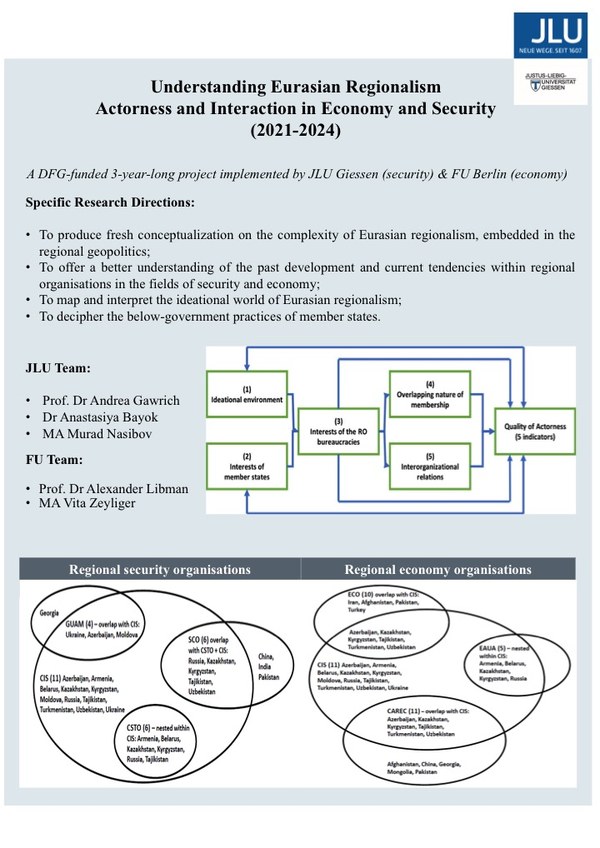
See following Publication
- Nasibov, M., & Gawrich, A. (March 2024). EAEU and other post-Soviet integration organizations. In A. Libman & E. Vinokurov (Eds.), Elgar Companions to International Organisations. The Elgar Companion to the Eurasian Economic Union (First, pp. 162–175). Edward Elgar Publishing.
Presented at Conferences:
- Regional Organisations As Arenas of Strategic Self-Positioning: Central Asia and South Caucasus (CASC) Region. Gawrich, A. & Nasibov, M., SVPW Kongress 2024, 8-9 February 2024, St. Gallen, Switzerland.
- Power Dynamics in the CASC Region & its Implications for European Security. A Theory Guided Observation. Gawrich, A. & Nasibov, M., DVPW IB-Sektionstagung, 14-16 June 2023, Friedrichshafen, Germany.
- Decoding the Toxic Ideational World of Post-Soviet Regionalism. Gawrich, A. & Nasibov, M., DVPW IB Sektionstagung, 14-16 June 2023, Friedrichshafen, Germany.
- Decoding the Toxic Ideational World of Post-Soviet Regionalism. Gawrich, A. & Nasibov, M., The Sevenths Annual Tartu Conference on East European and Eurasian Studies, 11-13 June 2023, Tartu, Estonia.
abgeschlossene Forschungsprojekte
-
Externe Demokratisierungspolitik durch Regionalorganisationen – Strategien von Europarat, OSZE und OAS im Vergleich Habilitationsprojekt, abgeschlossen 3/2011.
- EU Eastern Neighbourhood: Economic Potential and Future Development. Kooperationsprojekt mit dem Institut für Weltwirtschaft (Rainer Schweickert) (Teilprojekt eines größeren internationalen EU-Projektes) 10/2006-9/2010.
- Political and Economic Challenges of Resource-Based Development in Kazakhstan and Azerbaijan. VW-Projekt gemeinsam mit Institut für Weltwirtschaft 7/2005-12/2010.
- Benchmarking European Integration 2004 Kooperationsprojekt mit dem Institut für Weltwirtschaft (Rainer Schweickert).
- Strategien der Umweltpolitik in jungen Demokratien: Osteuropa und Lateinamerika im Vergleich 2001, Ruhr-Universität Bochum.
- Ethnische Minderheiten und der Transformationsprozess in Polen 1999-2001 VW-Forschungsprojekt, Ruhr-Universität Bochum.
- Laufende Qualifikationsarbeiten
-
Promotionsprojekte
- Nasibov, Murad: Civil Society within Authoritarian Regime: The Cases of Russia and Turkey
- Bezkadi, Fadi: Die Nahostpolitik Russlands und der USA: Zwischen Kooperation und Konkurrenz
- Vandergrift, Maraike: Germany and Poland in international Arenas – between Competition, Cooperation and Rivalry
- Fix, Liana: The Germanification of European Policy towards Russia (2019 erfolgreich abgeschlossen)
- Kirch, Anna-Lena: The Impact of Subregional Cooperation on European Integration (2020 erfolgreich abgeschlossen)
Habilitationsprojekte
- Lusine Badalyan
- Nasibov, Murad: Civil Society within Authoritarian Regime: The Cases of Russia and Turkey
Lehre
- M5 MAP
-
Prof. Dr. Andrea Gawrich ist Modulverantwortliche für das Modul 5 im Lehramtsstudiengang Politik & Wirtschaft.
Die Modulabschlussprüfung (MAP) setzt sich zu gleichen Teilen aus den Inhalten der Vorlesung sowie der beiden Seminare zusammen. Weitere Informationen entnehmen Sie bitte den Absprachen im Seminar/in der Vorlesung.
Die Modulabschlussprüfung (MAP) im Modul 5,
Lehramt Politik & Wirtschaft (Kohorte 2022/23),
wird am
Mittwoch, 04.10.2023 von 14 bis 16 Uhr in Raum E207
stattfinden.
Bitte seien Sie pünktlich um 13:45 im Raum und kontrollieren Sie frühzeitig (vorab!), ob Sie für diese MAP in FlexNow angemeldet sind und alle Vorleistungen erbracht haben.
- Lehre
-
Wintersemester 2023/24:
- The Democracy-Security Nexus (S)
- EU Democracy Support Policy (S)
- Deutsche Außenpolitik und globale Ungleichheiten (S)
- Europäisierung im Vergleich (VL)
Sommersemester 2023:
- Die Europäische Sicherheitsordnung (S)
- Deutsche Außenpolitik (S)
- Deutsche Außenpolitik und globale Ungleichheiten (S)
Wintersemester 2022/23:
- Ringvorlesung
Sommersemester 2022:
- European Security Policy (S)
- EU Migration and Refugee Policy (S)
- Die Europäische Sicherheitsordnung (S)
- Sicherheits-Studien (S)
Wintersemester 2021/22:
- EU Democracy Support Policy (S)
- Europäisierung im Vergleich (VL)
- Sicherheits-Studien (2. Teil) (S)
- Ringvorlesung
Sommersemester 2021:
- European Security Policy
- International Democracy Promotion
- Sicherheits-Studien
Wintersemester 2019/20:
- Comparing Democracies and Autocracies (S)
- International Security Policy (S)
- Parlamentarische und präsidentielle Systeme im Vergleich (S)
- Europäisierung im Vergleich (VL)
- Ringvorlesung
Sommersemester 2019:
- Deutsche Außenpolitik und globale Ungleichheit (S)
- Die europäische Sicherheitsordnung und die NATO (S)
- Populäre Musik und Politik (S)
- Präsidentialismus im Vergleich (S)
Wintersemester 2018/19:
- Außenpolitikforschung (S)
- Europäische Sicherheitsarchitektur (S)
- Qualitative Research Designs and International Relations (S)
- Europäisierung im Vergleich (VL)
- Ringvorlesung
Sommersemester 2018:
- Außenpolitikforschung (S)
- Deutsche Außenpolitik und globale Ungleichheit (S)
- Die europäische Sicherheitsordnung und die NATO (S)
- The EU Migration and Refugee Policy (S)
Wintersemester 2017/18:
- Demokratien vs Autokratien (S)
- International Democracy Promotion (S)
- NATO's Security Policy (S)
- Europäisierung im Vergleich (VL)
- Ringvorlesung
JLU
- JLU
-
GiZo
Frau Prof. Gawrich ist stellvertretende Geschäftsführende Direktorin des Gießener Zentrums Östliches Europa. Weitere Informationen dazu finden Sie hier.
GiZo Sektion IV "Sicherheitskulturen im östlichen Europa"
Frau Prof. Gawrich ist Leiterin der GiZo-Sektion IV. Weitere Informationen dazu finden Sie hier.
GGS-Sektion
Frau Prof. Gawrich leitet die Sektion "Internationale Sicherheit und Staatlichkeit" des Gießener Graduiertenzentrum Sozial-, Wirtschafts- und Rechtwissenschaften (GGS). Weitere Informationen dazu finden Sie hier:
Praktikumsanerkennung MA DuG
- Praktikumsanerkennung im Masterstudiengang Demokratie und Governance
-
Liebe Studierende unseres MA,
hier finden Sie das Anerkennungsformular zur Praktikumsbescheinigung. Bitte fügen Sie Ihren Namen, Ihre Matrikelnummer, das Datum, den Stundenumfang und den Namen des Ausstellers/der Ausstellerin Ihres MA-Zeugnisses in das Formular ein.
Bitte senden Sie den Formular-Entwurf gemeinsam mit Ihren Praktikumszeugnis an Prof. Dr. Andrea Gawrich (andrea.gawrich@sowi.uni-giessen.de und mechthild.lamonica).
Auszug aus der Studienordnung:
„Im Modul M9 besteht die Möglichkeit zur Anrechnung eines fakultativen Praktikums im Umfang von mindestens 300 Stunden.
Anerkannt werden Praktika in Betrieben und anderen Einrichtungen zukünftiger Berufsfelder des Studienganges „Demokratie
und Governance"
In der Regel werden Tätigkeiten in
- Planung und Verwaltung in Bund, Ländern und Gemeinden
- Parlamentarischen Diensten in Bund, Ländern und Gemeinden
- Parteien und Fraktionen in Bund, Ländern und Gemeinden
- Internationalen Dienst und Organisationen
- Verbänden und Interessenvertretungen, Wohlfahrtsverbänden
- Politischen Stiftungen, weitere kulturellen und politische Initiativen
- Einrichtungen der politischen Bildung
- Medien ( Presse, Rundfunk, Fernsehen, Internet)
- Öffentlichkeitsarbeit, PR, Marketing und Werbung
- Markt-, Medien-, und Meinungsforschung
- Politikberatung (Campaining, Public Affairs)
- Non-profit / Third-Sector-Organisationen
- Nichtregierungsorganisationen, auf nationaler und internationaler Ebene (v.a. Organisationen im Bereich Social
Economy, Democracy Assistance, Wahlbeobachtung, Krisenprävention und zivile Konfliktberatung)
- Sozialwissenschaftliche Lehr-und Forschungseinrichtungen
anerkannt.“
Prof. Dr. Andrea Gawrich

